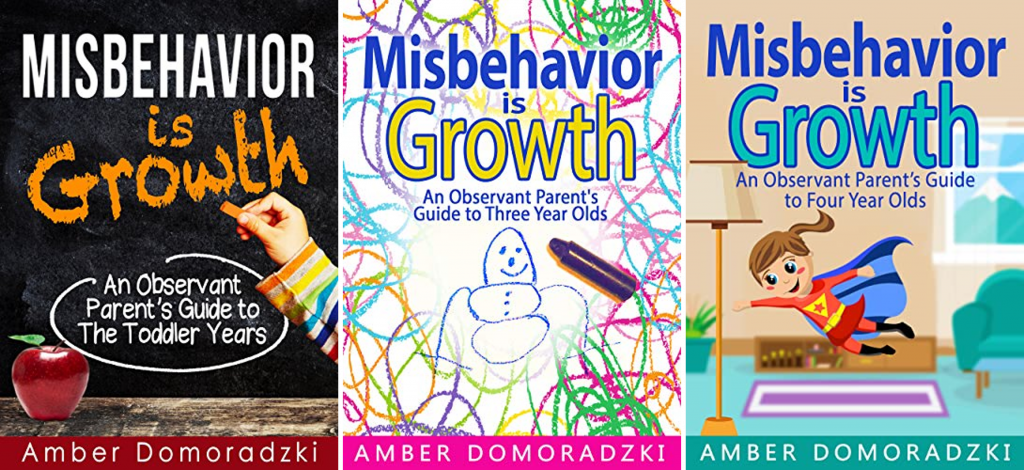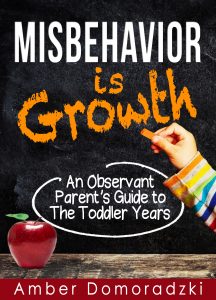Bringing Precision to Common Sense
Wondering why your one year old is so clingy and when it might change? Or why your two year old all of a sudden has an epic meltdown over getting out of the bathtub? You are at the right place!
I’m Amber, “The Observant Mom,” homeschool mom of 3, and I’ve been documenting these age-related milestones. This is the summary of the developmental milestones that my work has found. Each milestone starts with a child who becomes difficult to deal with–more demanding anyway–and ends with amazing new mental abilities.
The page below has the toddler milestones. See “Milestones” above for older ages, which currently go to 10+. Or jump to the links here:
3 and 4 Year Old Milestones
5 and 6 Year Old Milestones
7 and 8 Year Old Milestones
9 and 10 Year Old Milestones
11 and 12 Year Old Milestones
The Observant Mom APP!
You’ve been asking for it and here it is! The Observant Mom APP! It’s the same information–just in calendar form! The app now goes from 18 months to age 8 ! Please see more about The Observant Mom App and send any comments, questions or concerns to helloamber@gmail.com.
What others are saying about The Observant Mom App
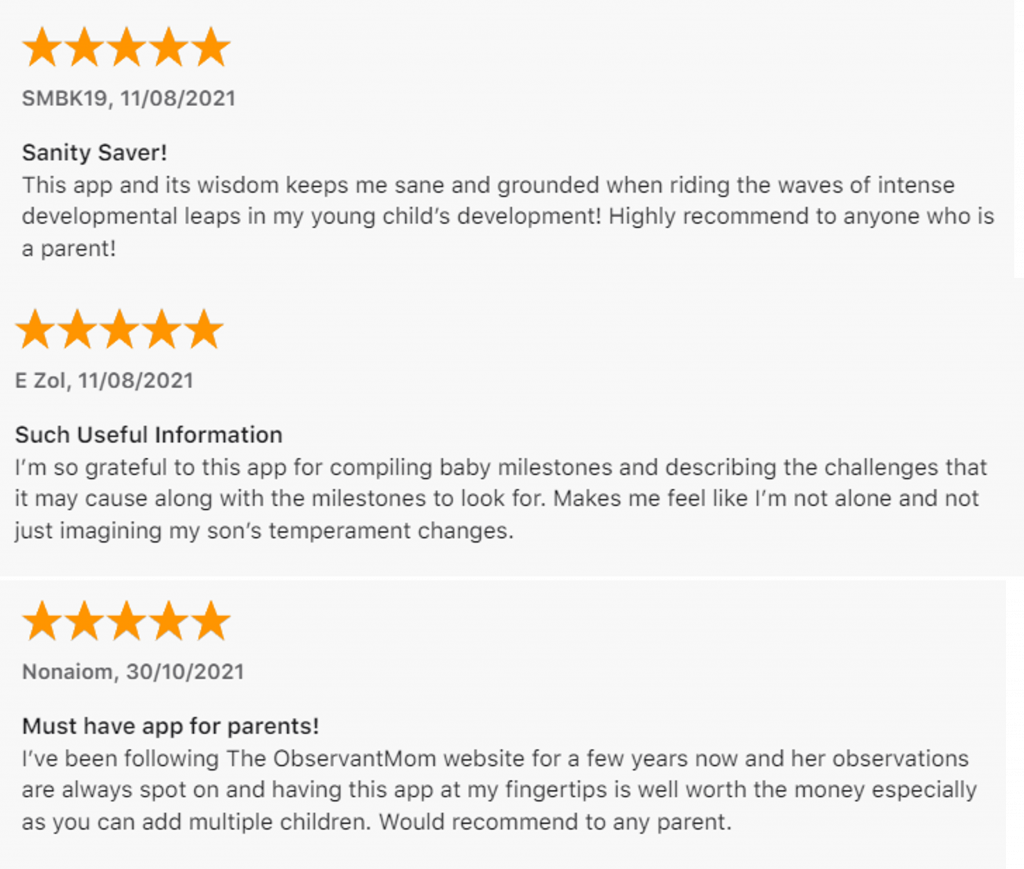
Misbehavior is Growth
See my book series, Misbehavior is Growth, on this for ideas of how to handle the difficult behavior and educational activities to nurture the growth.
- Misbehavior is Growth: Toddlers
- Misbehavior is Growth: Three Year Olds
- Misbehavior is Growth: Four Year Olds
Other Languages
This work is now being translated into other languages!
Donate
Show your support for my child development work by donating! Donate with this link or click the button below.
I am committed to keeping the work on my website for free! I appreciate your donations, recommendations, and positive reviews!
About the work
First time user? Please read below to better understand some of this work. The quick links for return users are directly under the age calculator.
For your convenience, here is a calculator to determine how old your child is. British users note: It is in mm/dd/yyyy format.
Subscribe!
Subscribe to The Observant Mom and get a link to a FREE printable PDF with the summary of all finalized milestones, which currently are the Toddler, Three Year Old, and Four Year Old Milestones. You can also download this PDF file below, but by getting the email is a perfect way to share with your friends, family, and caregivers about the milestones so they understand them and support you. [Be sure the initial email doesn’t go to spam; it should arrive immediately.]
Quick Links
Here are quick links for the frequent users of this page. Direct people to the milestone their child is at by clicking these links and sending them the link. Bookmark this to come back for more! This was last updated on February 1, 2021.
Toddler Milestone 1: 18 months
Toddler Mini-Milestone 2A: 19 months, 2 weeks
Toddler Milestone 2B: 20 months
Toddler Milestone 3A: 21 months
Toddler Milestone 3B: 22 months
Toddler Milestone 4: 23 months
Toddler Milestone 5: 2 year, 1 month
Toddler Milestone 6A: 2 years, 2 months
Toddler Mini-Milestone 7A: 2 years, 3 months
Toddler Milestone 7B: 2 years, 4 months
Toddler Milestone 8A: 2 years, 6 months
Toddler Milestone 8B: 2 years, 7 months
Toddler Milestone 9: 2 years, 8 months
Toddler Milestone 10: 2 years, 9 months
Toddler Milestone 11: 2 years, 10 months
Toddler Milestone 12: 2 years, 11 months
- Jump to the 3 and 4 Year Old Summaries
- Jump to the 5 and 6 Year Old Summaries
- Jump to the 7 and 8 Year Old Summaries
Come join the discussion, Misbehavior is Growth: The Discussion.
Free PDF Summary
This is a summary of all finalized milestones for you to print. It includes milestones from 18 months to 8 years. This file was last updated October 2, 2023.
Open the PDF in a web browser: Observant Mom Child Developmental Milestones
Feel free to print and share the PDF!
Toddler Milestones
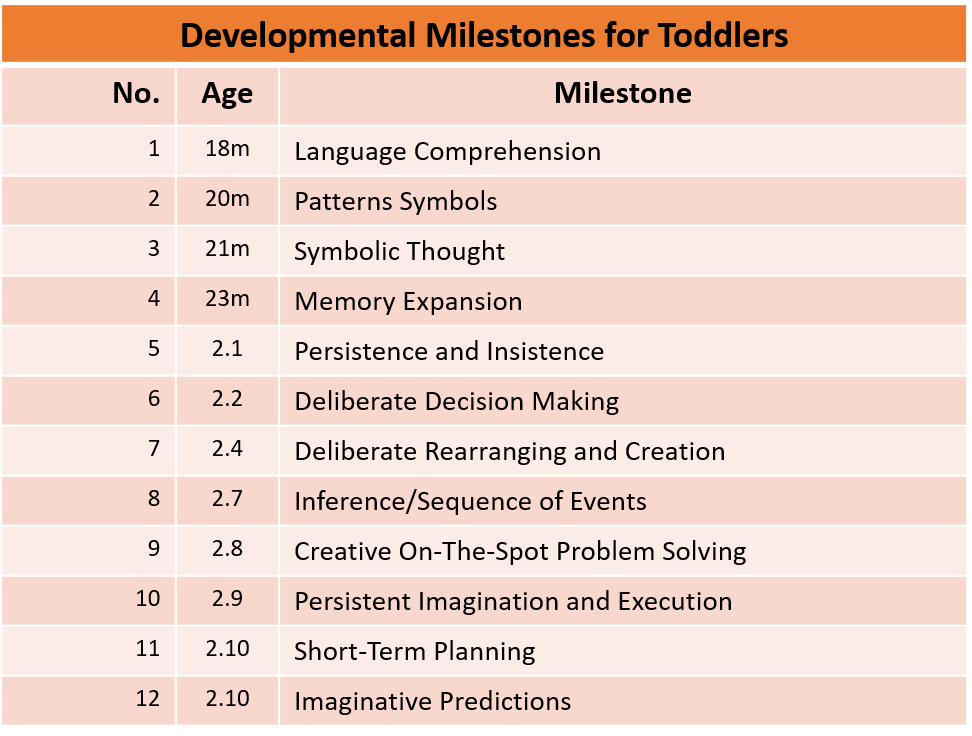
How Understanding Childhood Developmental Cycles Helps YOU!
Understanding the cycles can help you
- Stay patient as a parent
- Know that the behavior passes
- Know that you are are not a bad parent nor do you have a bad kid
- Help give their new growth WINGS!
This is the #1 comment I get about this work: It helps parents stay patient.
Surviving then Thriving
I want to show you how understanding the milestones can help you in your everyday life as a parent. I include, in addition to the summaries, two sections at the milestones: one called Surviving and another called Thriving.
Surviving
The surviving section has links to deal with the difficult behaviors and situations–meltdowns, defiance, and such. The tools are meant to give food for thought and to be pattern breakers for where you might get sucked into the negativity that the developmental cycles sometimes bring. Above all else in my surviving section, I assume the child is not bad and that we work around the normal age-related behavior. I have started to call this Nonresistant Parenting.
I want to stress that these are just tools. I believe a fundamentally attached relationship must be in place as the source of all sources to calm the child down. They need to feel like their needs are responded to most of all. I talk about such attachment in some of the tools about emotional regulation. These stages make clear what we already know: parenting is a fulltime job and children need our seeming near constant presence. This is not in your head, my argument is that by biological design they are meant to demand our attention as they go through each tumultuous stage. I am trying to make us, as an entire society move towards the idea of Generous Parenting.
But otherwise, the tools are on top of this and meant to help in situations when you have to get them out of the bath tub, into the car, and so on. Some of the tools also model healthy conflict resolution skills (I statements, active listening, problem solving). The tools are meant to give ideas for when you are at a loss. They also offer a bit more insight into why, say, distraction works so well in the late ones, but a more directed distraction is needed in the early twos, or why “I” statements start to “work” in the late twos. People tell me they like my work and tools, because I explain why some things work so well at certain ages. Some tools will work for some people. Not all are going to work for every child or family. Please play around with them and respond to your unique child.
And I’ll be upfront: my goal is not to make sure our children always act polite in public. It’s not to appease relatives who want “better” behaved children. My goal is to show people this “misbehavior” is normal–it’s temporary and even necessary. My main focus is on respecting child development as much as possible, which usually means as much freedom as possible. Let me be the bad guy for you. Direct others here so they can read it from me.
Thriving
The thriving section has links to educational ideas to do at that milestone. It is not all the ideas I have. You can find those in my book. It’s just a few to show off what can be done. See my reading program in particular as an example of how to take advantage of the milestones: learn to read in an easy, joyful, conceptually clear way deeply rooted in age-related development. I fundamentally believe we should lean into the brain growth.
The surviving and thriving sections show off what I want to show with this work: you can use this information to your great advantage for you as a parent and for your child’s development. These cycles are times of turmoil. Past advice usually has one punishing or correcting it or, for the more enlightened, ignoring it to “not feed the attention.” I want to show that these cycles are more like a giant sign–a Bat signal in the air–that our children are begging us to come to them at developmentally critical times. Children literally cling to their parents or evoke their attention in other ways. Go to them with love and comfort. This is not “rewarding bad behavior.” This is Generous Parenting.
Further, if you can handle these times with gentleness, guidance, and wisdom–and invest in them as the learning opportunities that each milestone is– you will see that on the other side is a child who has an outstanding and robust new skill set. I want to show what you can do when you take a deep dive into their inner life. You can unleash an enormous potential by understanding the cycles. The stages are very dual natured. When they become paralyzed to act, they will soon be confident. When their memory goes to pot, it will soon be incredible. That’s how it works. This is the idea behind my book about this: Misbehavior is Growth: An Observant Parent’s Guide to the Toddler Years.
See my expanded thoughts in this three part series:
- Child Development Part 1: Misbehavior is Inevitable
- Child Development Part 2: Misbehavior is Manageable
- Child Development Part 3: Misbehavior is Growth
About the Author

Hi! It’s me! Amber (“The Observant Mom”)
I have an Industrial Engineering degree from Penn State. I worked in software as a test and integration engineer for 10 years before becoming a stay-at-home mom. I homeschool my 3 children. I have read literally dozens of books on parenting and education, including the major ones about child development, which are incorporated into this work. I hope most of all that you find my work useful to you in your parenting journey. Drop me a line if you want, helloamber@gmail.com.
Find this page useful? Want more to understand these cycles–and stop blaming you as being a bad parent? Know a struggling parent who might benefit by knowing what they are going through is normal? Please recommend this work to friends and family. Direct them straight to The Observant Mom webpage or my Facebook page.
Help spread the word about developmental stages by directing people to this work. It’s not misbehavior: it’s growth! Your understanding and comforting presence in children’s lives helps and makes everything go better.
How to Use the Milestones
I strongly recommend starting with the due date to line up with at first. Then adjust slightly from there. My analysis shows the milestones pretty consistently align with due date, though they can “drift” occasionally, somewhat based on birth date. Some children sometimes go through two milestones at once. I note when this happens.
My best advice about using the work is to use it as issues arise or you want more information. Don’t read it and expect a child to conform to everything listed. Read it so you feel more enlightened about your child, not worried. Worry can go two ways: either worry that they don’t follow the new abilities or worry that the upcoming milestones are going to be terrible. The best way to use the milestones is to look for identifying characteristics of the milestone itself and then correspond it to your child. Please take each milestone one at a time.
Feedback
If you find your child deviates from the milestones and want to contribute, you can submit feedback. I have a feedback form on this site. The best way to contribute however is to join the discussion forum and give routine feedback. This way I can get to know your child. It’s a lot easier for me that way. Several mothers have given continuous updates like this and greatly improved the work. I thank them heartily!
Please respect my hard work by respecting the copyright protection that this has. Please send people who are interested here to this link.
Toddler Milestone 1 – Language Comprehension
Starts: 18 months
Most Intense: 18 months, 1 week until 18 months, 3 weeks
Ends: 19 Months
Irritable Period Summary
Clingy
• Very clingy
• May be in your lap a lot
• May be with you in the bathroom
Wild, Exuberant, Meltdowns
• Can be wild and exuberant, running around a lot, smiling
• Or may put things right in your face/mouth
• Occasional meltdowns
Sleep Issues
• Sleep schedule becomes erratic, e.g., unreliable nap times
Most Intense Period
• Wants to be held all the time, many meltdowns
New Abilities Summary
Language Comprehension
• Explosion in language comprehension
• Might learn a new word or two per day
• Differentiates much more: cow versus horse; night versus day; etc.
• For children who are talking (and some don’t even until age three or older), an increase in words spoken, about one new word per day
• Spoken words are better enunciated.
• Advanced language children (often girls) talk in complete sentences (three or four words). Please do not compare your children negatively to this list! Look for the good in your child.
Symbols Represent Something
• Uses something other than an object to represent the object
• Might put their hand to their ear as a “phone”
• Might put long green Mega Bloks together and call it an “alligator”
• Might ask you to put sunscreen on their back by pretending to do it with a nearby object then signaling to put in on them
• At this one, the object resembles the symbol; a hand is a phone, green bricks are an alligator. At later milestones, they can use something quite unlike the symbol.
• Might understand the idea of counting and may be counting
Follows Verbal Request Better, Based on the Word Alone
• Understands and executes the function of an object based solely on a verbal clue, e.g., runs over to get a jacket after the word “jacket” is said
• Or goes to the blender after “smoothie” is said
• Can answer a question but answers it by pointing to something or getting it
More Respectful/Follows Some Requests Better
• Follows verbal requests better, e.g., “Please get your bottle”
• More respectful of others when asked to be, e.g., doesn’t step on their sibling after you ask them not to
Self-Awareness
• They are more self-aware now.
• Before, they could light up with joy, smile, be in awe of what is around them, etc. Now they are aware of that very joy.
• They might run around with a toy or food and it’s as if they notice the joy that it is to run around, specifically like that
• Or they might drape themselves in different fabrics, enjoying how the fabric makes them feel and look
• They might be a burst of sunshine, enthusiastically waving at strangers.
• They might have somewhat more deliberate behavior, such as looking at you with slightly more joyful, mischievous eyes.
• More awareness of and interest in body parts
Physical Skills
• Many fine motor skills such as doing puzzles or scribbling
• May copy what fine motor activities other children do, such as wrapping rubber bands on a Geoboard (a mathematical manipulative with a grid made of pegs that rubber bands can be stretched around)
• May like to “scoot” on a tricycle or scooter
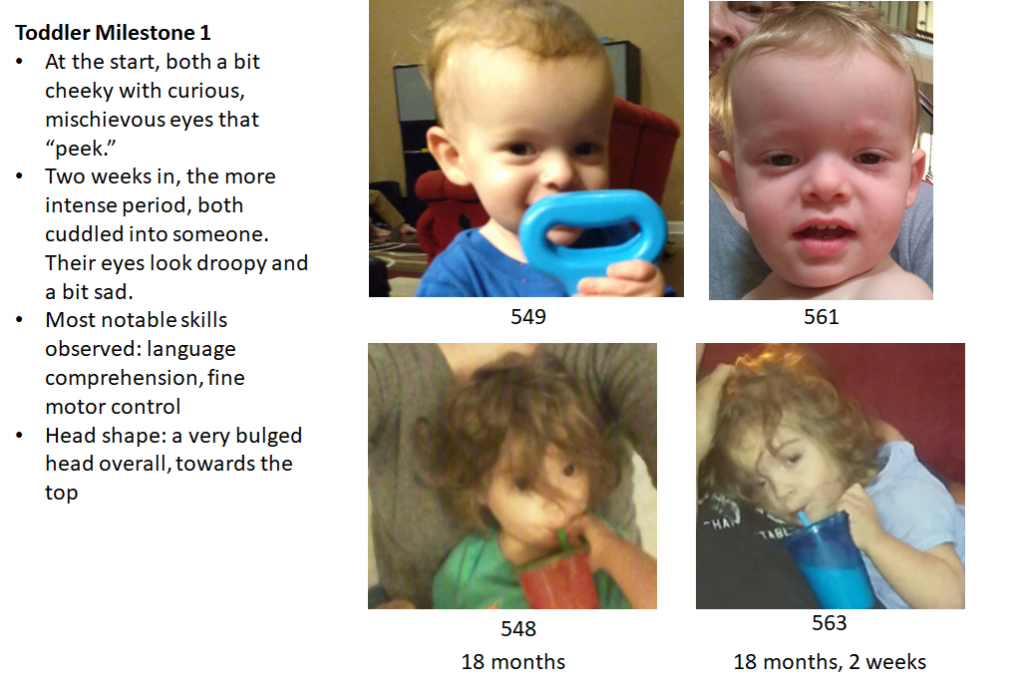
Surviving
- Top 5 Tools for Staying Patient as a Parent
- Toddler Conflict Resolution Tool: Distraction is Not Distraction
- Toddler Conflict Resolution Tool: Redirection Gets Your and Their Needs Satisfied
- Flowchart to Use During Meltdowns
- Humanizing Toddlers
Thriving
Toddler Mini-Milestone 2A
Starts: Lasts for one or two days around 19 months 2 weeks
Irritable Period Summary
• Cranky
• Out of Sorts
• Wants to be near you
• Nap time changes on and around this day, perhaps being tired later than usual for nap
• Slight fever on this day, with no other symptoms of flu
• Much more likely to become ill however
New Abilities Summary
• It is hard to ascertain what they think at this one, as it is so brief, they are so young, and the next one starts so soon after.
• But given the future milestones, it almost has to be a thought that they can arrange symbols in a way to their liking.
• In the next milestone (2B), they can, say, arrange parts to make Mr. Potato Head’s face. They then go on to playfully manipulate those symbols in ways other than intended (3A). They then firmly understand that symbols can represent something but are not the thing (3B). Hence I propose that framework might be put in place here.
• Either way, I think this one is related to the next one, 2B, hence they are clustered together as Milestone 2A and 2B.
Toddler Milestone 2B – Patterns Symbols
Starts: One week before 20 months
Most Intense: 20 Months
Ends: Shortly after 20 Months
Irritable Period Summary
Major Sleep Issues
• Sleep problems: please expect naps won’t be normal
• Might wake up in the night
Clingy and Cranky
• Extra crankiness
• Wants to be held and put down over and over
• Wants a lovey to go places with them
Most Intense Period
• One particular day is likely to be noticeable: Confused, stumbles when they walk, needs to be near you for an extended period of time, may be in and out of sleep all day, might have baby nightmares, wakes up from this state scared and confused, may have a mild fever for one day with no other symptoms of flu.
New Abilities Summary
• In Milestone 1, they better understand that a symbol represented something.
• Now they start to play around with “symbols.” They put objects into desired patterns and notice more patterns in the events around them.
Strings Objects Together
• Arranges disparate objects as to represent something real, e.g., Mr. Potato Head’s face
• Might put together LEGO DUPLO toys
• May love Mega Bloks
• Arranges things to form a very basic pattern, such as in a line or a in a stack
Understands Symbols Match Objects (But Plays Around with It)
• Understands who owns what, such as this is mom’s phone and should be with mom
• Purposely takes sibling’s favorite animal, blanket, or other lovie (suggesting they know that lovie belongs to their sibling)
• When they scribble, they might say it means something now, such as “Mommy” or “Lightning McQueen.”
• Can verbally identify 1 or 2 colors
Strings Events Together
• Sees the particular events that make up a routine, how they relate and how they differ
• Understands the full routine of something well. They might help you make a cup of coffee in the morning and initiates (and may do) all steps correctly.
• Or may put their toys away on shelf
• The sequences they execute might have more steps, such as getting dog food out and putting it in the bowl.
• Understands and initiates daily routines. They might initiate turning a TV on if that’s what you do in the mornings.
• Wants to do routines, for instance, wants to watch you make their bottle or cup of milk, not just be handed it
• May be upset if routines are missed, such as if you skip brushing their teeth one night
• Follows along with simple, dramatic stories, in which events change, such as We’re Going on a Bear Hunt by Helen Oxenbury and Michael Rosen
• Loves songs with a twist, such as “Pop Goes the Weasel”
• May love Ring-Around-The-Rosie, where you all go in a circle and then fall down
• Might be able to do the actions to a song such as “Rock-a-Bye Bear”
• Note to string events together like this requires an increase in memory
Matches a Simple Action to the Right Situation
• They can apply a simple action to the right situation.
• If milk spills, they might go get a paper towel.
• If they get on a bus, they might recognize that the bus driver says “Move on back,” as from the song “Wheels on the Bus.”
• They can answer a simple question. They can reply with “ya” and mean it now.
• Or they can pick what shoes they want
• Or they can point in the direction they want to go after being asked
• Says “uh oh” when someone is about to fall, as they recognize the danger
• Gets scared of certain noises, such as thunder, as they better understand the threat it may be to them
• May laugh at jokes
• Increase in words spoken, mostly nouns and verbs (i.e., an object as tied to an action)
Manipulates Simple Events
• Deliberately tries different solutions to achieve an end goal, such as making two magnets stick, buckling a seatbelt, or laying a blanket down to make a “bed” to lie down on
• Might show a sad face or cry with the intent of getting another person to do something for them
More Consistent in Fantasy Play
• Fantasy play is more consistent, e.g., consistently flies a toy airplane around as a toy airplane
• Consistently brings favorite animal, blanket, or lovie with them places (suggests a firmer understanding of the continuous nature of time)
• Sings parts of songs

Surviving
- Top 5 Tools for Staying Patient as a Parent
- Toddler Conflict Resolution Tool: Distraction is Not Distraction
- Toddler Conflict Resolution Tool: Redirection Gets Your and Their Needs Satisfied
- Humanizing Toddlers
Thriving
- Mr. Potato Head is great for a child putting parts into a whole
- A dramatic book like Going on a Bear Hunt
- Buy Misbehavior is Growth: Toddlers
- Buy The Observant Mom App!
Toddler Milestone 3A—Mischief with Objects and Symbols
Starts: 20 months, 2 weeks
Most Intense: The week prior to 21 months up to 21 months
Ends: 21 months
Irritable Period Summary
First Part
• A noticeable head shape change, in which their forehead bulges forward, might alert you that this one is starting (around 20 months 2 weeks).
• It starts a bit mild and builds in intensity. Some might not notice it at the beginning (or they simply enjoy the activities the child is demanding, such as going on walks), depending on circumstances. Otherwise:
Demanding, Cranky, Jealous
• Cranky
• Wants to be in the same room with you always
• Grabs you by the hand constantly and brings you places to do things with them
• Wants to sit in primary caregiver’s lap or near primary caregiver often
• Jealous of other children
• Sleep issues: early morning wakings
Second Part
• There is yet another head shape change another week in (20 months 3 weeks). The second part shows more intense behavior.
• Spatially confused. For instance, they think they are on the floor when they are on the first stair of a staircase and fall down the step. Please be careful near pool stairs or at playgrounds.
• Totally out of sorts
• Can’t make up their mind, say of what they want for breakfast or perhaps can’t communicate it to you
• Drools a lot, puts hand in mouth
• Takes blanket or lovey everywhere
• Absolutely won’t forget when they leave something they want behind, e.g., their lovey
• Won’t use plates/cups properly but wants to use them in different ways. They carry them to a non-dining area or do something playful with them.
Most Intense Period
• Insists on being VERY near you, like in the crook of your neck, can’t communicate what they want or seems unable to make up their mind, wants to do everything in some specific way that they can’t communicate effectively, sleep disruptions.
New Abilities Summary
Tries New Things
• Sees a challenge they think they can do, which they’ve never done before, and steps up and does it, on their own initiative.
• As an example, they pull a very heavy thing that you don’t think they can do—and then do.
• Very independent and insists on doing things independently, like getting their own food
• Likes watering plants with a trickle of water from a hose
• It’s as if this is a bridge between TM 2B (the last one) and TM 3B (the next one).
• In previous milestones, they were mastering the manipulation of symbols and taking part in routines.
• At this one, they take a risk to do something they can’t do. Next, they will be more confident in their manipulation of symbols and objects.
Uses Objects in a Way Other Than Intended
• They also play with objects in a “wrong” way purposefully.
• They may play with plates in a way other than eating on them, put your dress on, or insist on eating a fruit while walking around in a store.
• They might like to cloak fabrics around themselves, such as clothes too big for them or big fluffy towels
• This play time may be needed to facilitate the next milestone, when they are capable of confident symbolic manipulation, in which they creatively use items for something other than their original intended use.
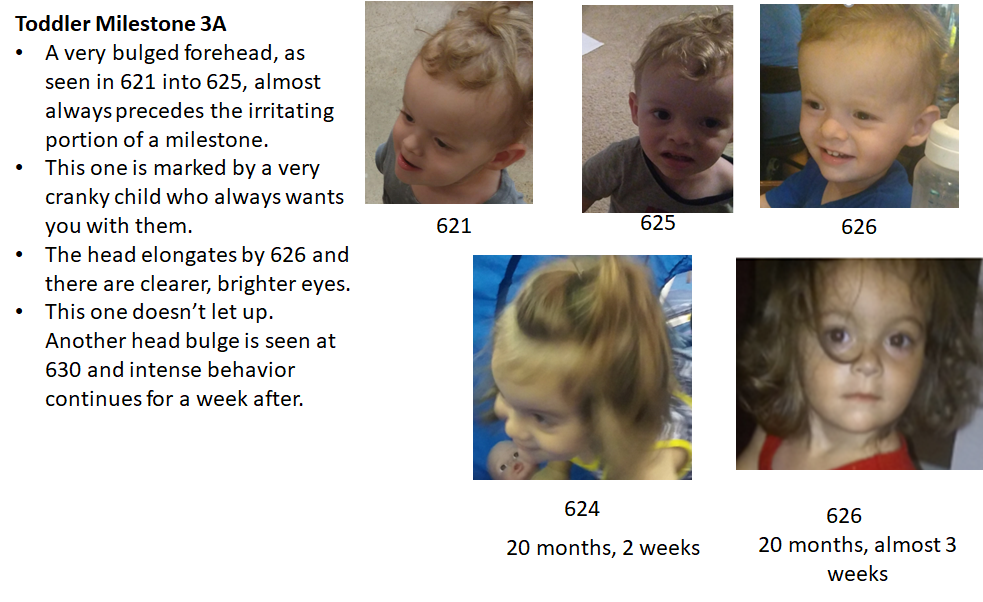
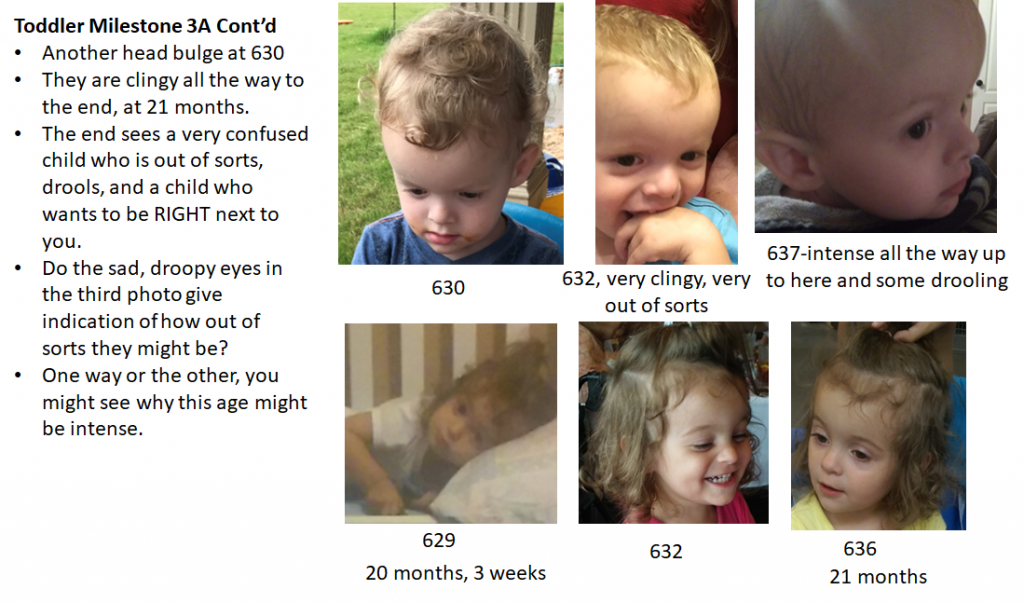
Toddler Milestone 3B–Symbols are Symbols
Starts: 21 Months 1 Week
Most Intense: 21 months 3 weeks until a few days after, then dissipates.
Ends: Between 22 months and 22 months 2 weeks
Irritable Period Summary
Clingy
• Mild at first, asks to be held a lot
• Might demand you do things with them, such as go on a walk
• Wants only their primary caregiver
• More intense meltdowns than before
• More willing to be away from you at times. But when they do get separation anxiety, it’s intense.
• Wants a lovey or blanket to come with them everywhere
Demanding and Picky
• Demanding, such as what to watch on TV
• Picky, e.g., about what clothes to wear. Perhaps their newly formed symbolic thought makes them more acutely aware of what is on their shirts (sparkles, pictures, etc.)
• Or picky about how to eat food, e.g., wants to eat something straight out of the bag (take note of what you do and see if they are trying to mimic you)
Sleep and Physical Issues
• Stalls at nap and bedtime, demands story after story, song after song, etc.,
• Might skip naps
• There is a very noticeable change in head shape at 22 months.
• At close to 22 months, they might put things inside their cheek, such as their hand or grapes.
Most Intense Period
• Demanding, picky, may hit or throw, separation anxiety, sleep disturbances
New Abilities Summary
• Noticeably less clingy
• Less separation anxiety
• A very sunny period occurs around 22 months 2 weeks: they are filled with ecstatic joy and may play cute little cheeky games with you.
Confident Symbolic Manipulation
• They’ve been working with symbols for the past few milestones. It’s that they are sturdy and confident now. Something is a symbol and is used to represent something. It’s not the something.
• They might (intentionally) use an object to represent something else, such as a Lego to represent a teacup.
• Understands that symbolic play is just that and is silly, may prefer real things
• They do more with symbols. They don’t just find a green block if asked, they also count how many green blocks there are.
• They might be able to sort objects by both color and shape, such as a sorting toy in which the objects are different shapes and colors.
• Concrete to abstract matching games become possible, such as matching a Cinderella doll to a picture of Cinderella
• They might do this spontaneously, such as matching a stuffed animal they have to a real animal they see.
• This makes letter activities become possible, such as letter puzzles.
• Might thus understand abstract symbols, such as letters, better
• Might enjoy tracing shapes, such as circles, with a stencil
• Capable of learning many colors
• Counting might become refined
• Understands difference in gender
Pretend Play
• Pretend play, such as pretending to be a dinosaur, pretending to read
• Imaginative play based on real events, such as puts on a play with dolls based on what they’ve seen others do (perhaps tries to potty train a doll)
Conversational Flow and Back and Forth in How They Talk
• Simple conversational flow in how they speak
• Responsive to questions such as saying “I’ll find it” after asking “Where is your pillow?”
• If you ask them what someone is doing, they may respond with what the person is actually doing. “What’s mom doing?” “She’s making eggs.”
• They may do this nonverbally also by finding something, like their shoes, upon hearing that’s what you are doing
• They might initiate a “back and forth” game with you. For instance, they hide behind a door, fully expecting you to come find them.
• More complete sentences such as “I kissed mommy.” (Some see this in earlier milestones but you are likely to see an increase anyhow)
Increase in Practical Life and Fine Motor Skills
• Practical life activities explode: turning lights on and off, buckling seat belts, putting clothes on and such.
• They are just very aggressive and have fun with trying to do a lot more things.
• Figures out how to do something they want, such as turning a bin over to practice getting to a light switch (using objects other than as intended as in past milestones has come in handy!)
• Attempts a more challenging problem, such as putting a train track together (the kind that only fits together one way). They, however, might not be able to persist with it until completion yet.
• Can remember about 5 events of what is going to happen for the day (snack, play, lunch, store, home)
• Wants to drive your car
• Better fine motor control such as using a spoon better
• Better ability to regulate their own behavior such as placing the spoon next to their plate when done
Learns Quickly
• Learns new things quickly based on watching others.
• For instance, they might learn how to sit at a computer and pretend to use a mouse after seeing someone at the library do it.
• Or learns how to dip food in sauce after seeing at a restaurant for the first time
• Or picks up on any other thing, such as a new puzzle, quickly
Surviving
Thriving
- Get Off The Phonics Train Early: Phonics Followed by Functional Reading
- Buy Misbehavior is Growth: Toddlers
- Buy The Observant Mom App!
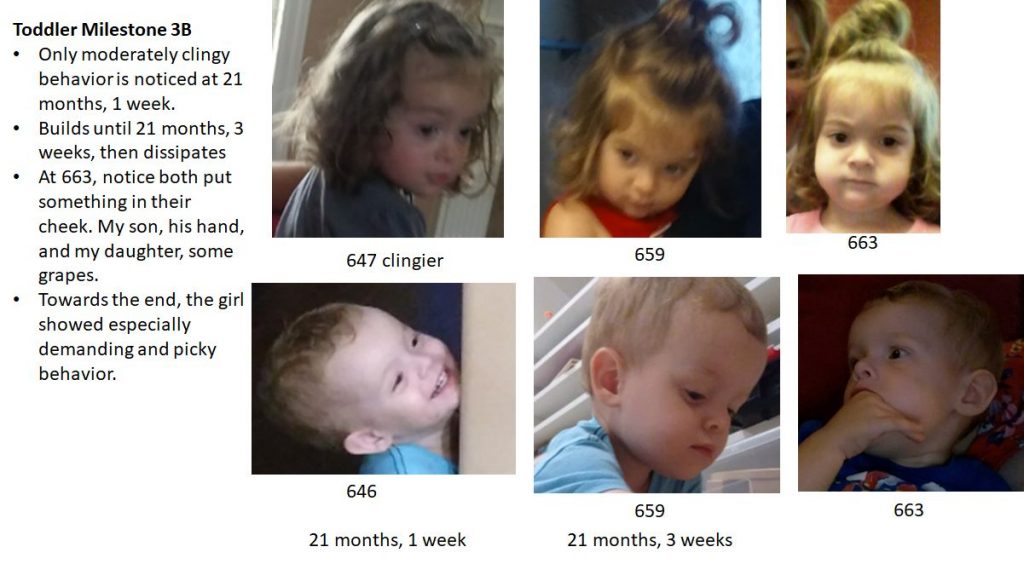
Toddler Milestone 4 – Memory Expansion
Starts: 22 Months, 3 weeks
Most Intense: 23 months to 23 months, 1 week
Ends: 23 months, 3 weeks
Irritable Period Summary
Clingy, Defiant
• Starts out with a child who is simply clingy and/or might wake up crying
• Wants only their primary caregiver at certain times
• Demanding of your time
• Defiant in doing normal routines, such as taking a bath
• Possible meltdowns. They are fine—until they aren’t.
• Might cry more
Sleep Issues
• Stalls going to bed (wants to read more books, play with toys, etc.)
• Skips naps
• When they wake up from sleep, they often cry
Crazy Behavior
• Crazy behavior: might crawl, climb on top of things, or put crayon on their face
• Grunts instead of answering questions
• May become slightly clumsier or fall easier or run into walls
Most Intense Period
• All of a sudden one day cries more easily or thrashes around, wants to be held, might seem confused, refuses naps for a few days in a row or other sleep disruptions (might wake up at night), might have a slight fever or get sick easier, and may demand large amount of time from primary caregiver
New Abilities Summary
Memory Increase
• Can remember entire songs
• Learns many words (10+) in a short amount of time
• Might be able to play the actual Memory Game
• They can answer a question about something not in sight, as they remember what the answer is, such as the color of something.
• They can remember stories and reference back to them, such as remembering a Thomas the Train plot line.
• They might say things not in sight, such as your family’s pet, are “missing.” This suggests they quite remember those things.
• Uses more complex sentences, with subjects, objects, verbs, and adjectives as opposed to simply “more!” or “more juice!”
Imagines One End Goal
• An increase in memory seems to always coincide with an increase in imagination. In this case, an ability to imagine one simple end goal.
• Persists at activities that require imagining/visualizing the end goal, such as putting a train track set together (the kind that can only fit together one way).
• Or they purposely pose with a certain facial expression, such as a cute pouty face. This suggest again that they can visualize this end goal.
• They seem to actually think about one option or another, such as “Do you want a kiss?” and they ponder if they do or not.
• They may associate wrapping a gift with a birthday or Christmas coming up.
More Proactive
• They can imagine more. And they think how they think things might go is how they should go. As such, they make their thoughts a reality more.
• Before they developed a flow to conversations. Now they initiate conversations, “Hi, Mommy! It’s nice to see you!”
• They might ask you to change their diaper
• You might ask to kiss them and they say no. Later they come up, “Kiss? Kiss?” It’s like they remember they can do such things now.
• They might run up to people and say, “Ready, set, go!”
• States opinions, e.g, “That’s crazy!”
Fine and Gross Motor Control
• Much more delicate fine motor control, e.g., careful in handling and transferring objects
• Might take an interest in using scissors
• Better at puzzles, knobbed cylinders
• Might have an increase in gross motor control, such as they start skipping, ride a balance bike, dance to the Wiggles, love to climb, or love to jump on a trampoline
Surviving
- Top 5 Tools for Staying Patient as a Parent
- Toddler Conflict Resolution Tool: Distraction is Not Distraction
- Toddler Conflict Resolution Tool: Redirection Gets Your and Their Needs Satisfied
Thriving
- Learn Letters
Synthetic phonics isn’t working - Buy Misbehavior is Growth: Toddlers
- Buy The Observant Mom App!
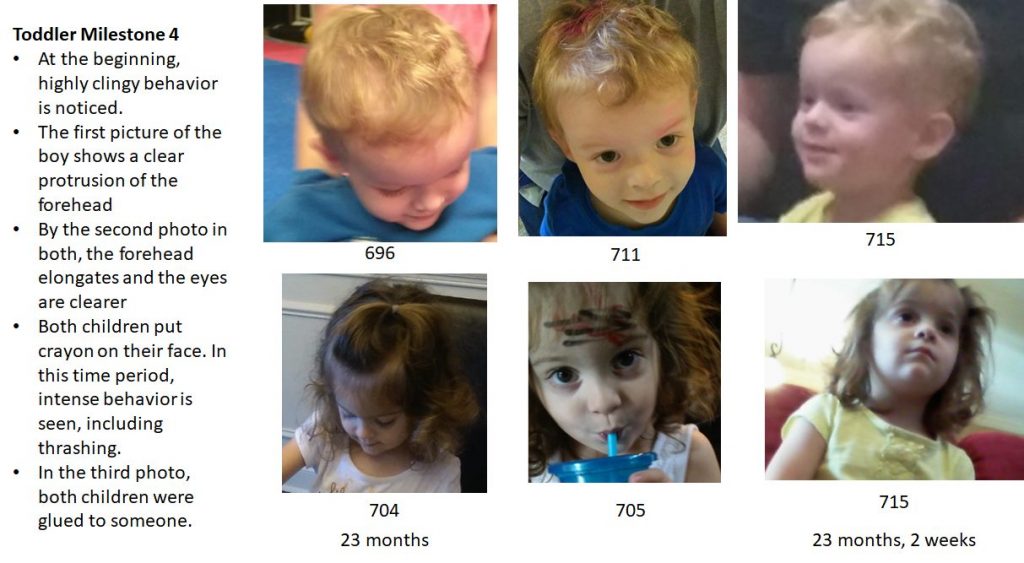
Toddler Milestone 5 – Persistence and Insistence
Starts: 2.0.1 [y.m.w]
Most Intense: 2.0.3 until 2.1.1
Ends: A few days after the intense period
Irritable Period Summary
• There may be a noticeable increase in head circumference slightly preceding the start of this one.
Clingy
• At first, it’s a child who might grab your hand and lead you somewhere a lot, wants to cuddle, be sad that you left, etc. Then that and possibly:
Bossy, Demanding, Rigidly Particular
• Bossy, demanding, and possibly whiny
• They are bossy and particular about you have to do. You have to sit on a particular chair or change their diaper a very particular way.
• Their favorite words right now might be “no,” “sit,” and “move.”
• They want things done exactly the same way as days earlier, which may not be possible and may result in a meltdown. For instance, their dad assembled a train track in a certain way, and you don’t know how they did it.
• Or they want a ball to roll down the stairs the exact same way each time
Defiant
• Higher propensity to bite (may happen only when they feel trapped such as being held against their will)
• Wants to push all the things and do all the things
• Hates diaper changes
• Takes clothes or diaper off (may be a desire to change their diaper on their own, diligent diaper changes may help)
Sleep Issues
• Won’t nap, stalls at naptime
• Clumsy (may be from not napping)
• May wake up at night
• May have fears at night
Most Intense Period
• The previously listed behaviors start out somewhat subtly and get increasingly more intense until the end of the most intense period. At its most intense is a very demanding child who wants you almost all waking hours.
New Abilities Summary
Persistent Over Days
• Comes back to the same activity day after day and gets better at it each day
• Remembers how something was done from a few days ago
• Their memory now is not over everything but very specific things that make a big impression on them.
Persistent at Activities
• Very persistent at accomplishing a challenge, e.g., a jigsaw puzzle or an app
• Can follow a simple verbal instruction about something new such as “hang this picture up with this tape over there” and they keep at it until they get it
• Might draw shapes such as circles
• Can count higher than they could previously
Insistent
• Insistent on doing what others are doing, e.g., to do what their older siblings are doing, such as painting with them
• They might have a sense that something or someone is gone forever (when it is), such as a toy is missing, and they keep asking where the thing or person went.
• Wants things done similar as before, such as how to build a train track
Language
• Very conversational
• Speaks two sentences, e.g., “Hi, Mommy. It’s nice to see you.”
• Gives their opinion, often, such as things are “beautiful”
Identifies, Empathizes with, or Invokes Emotions
• There is a very clear heightened reaction to emotions, in themselves and others.
• Take a look at how YOUR child does this. It’s a clue to their personality.
• They might identify their own emotions, as if it’s novel and interesting, such as, “Wow! Thunder! I’m scared of thunder!”
• They might tell you what they are scared of, many times.
• Might be struck by seeing the emotions in others, such as seeing a character in a book is sad
• Might purposely try to make you scared by dressing up in a “scary” outfit (a simple hat) and saying “Boo!”
Surviving
Thriving
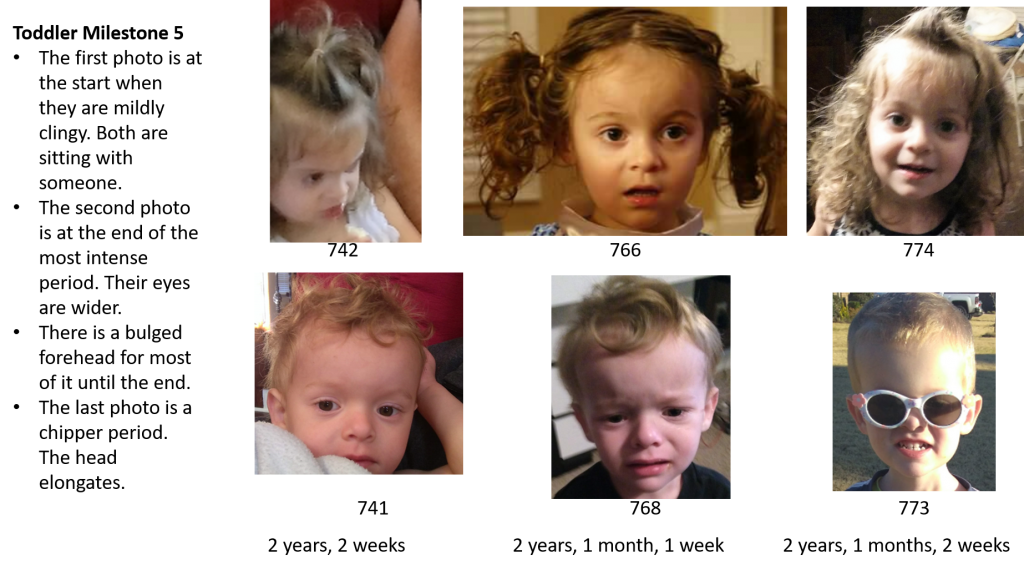
Toddler Milestone 6 – Deliberate Decision Making
Starts: 2.1.3 [y.m.w]
Most Intense: 2.1.3 until 2.2.1
Ends: 2.2.2 (or bleeds into the next mini-milestone)
Irritable Period Summary
• Slightly preceding this milestone is an increase in head circumference. It might be hard to fit old shirts over their head.
• There is also, at some point in this milestone, an increase in how long their tongue is.
Clingier
• For the most part, might just want to be cuddled
• Might ask to be picked up a lot
• Might cry, and you can’t figure out why
• Might ask for help a lot, “Help me! Help me!”
• Might easily have a meltdown, but they easily go back to happy if you can guess what they want
Bossy
• Bossy, e.g., about where you are allowed to sit
• Picky and stubborn: might want the same exact shirt day after day
• They can be aggressive or adorable in how they get bossy, depending on the child.
• Might not let you put on their pants (it’s probably because they want to pick what pants they wear)
• Insists you fill up their cup to a certain level with liquid
• Bossy about what movie gets played
• Might not let you sing a song—only them
Joke Playing
• Plays jokes, e.g., hides things from you on purpose or hides themselves
• Very likely to cheekily dress themselves up, such as in high heels or necklaces, entirely to elicit a reaction from others
Shows Regret
• Might show disappointment in whatever manner your child does: maybe dramatic slumped shoulders. Or full on meltdowns.
• Shows regret over past decisions. For instance, they choose one pair of shoes before going out, and then they want a different pair while out. They have a full on meltdown over it.
Sleep and Physical Issues
• Sleep disruptions, may be up at night
• Might drool or put their hand in their mouth
• Clumsy
• Might get sick easier
Fearful
• Before they seemed fearless. Now they show fear.
• Shows fear over specific things, such as thunder
• Fear of doing certain things, such as getting on a tricycle
Most Intense Period
• It varies from a child who just wants to snuggle a lot, gets sick more easily, or who does all of the bossy, stubborn behaviors listed above but more intensely with full meltdowns.
New Abilities Summary
Decision Making
• Can intelligently alter their course if one way isn’t working,
• They might use a different word when they see you aren’t communicating together well. They might be saying “plate,” but you think they are saying “paint,” so they say, “a WHITE plate,” to help clarify.
• Or they want frosting on a cake, but they already have some. Finally they say, “the GREEN frosting,” so you know which kind they want.
• Thus you may find yourself “having full conversations” with them.
• They can look in a different direction in a book to find a picture, if one way isn’t proving successful.
• They can understand and answer a question like “Do you want to walk up the stairs or be carried?”
• Very deliberate and particular about what they want, e.g., what movie to watch or how high the liquid in their cup must be filled
• Loves to be asked questions so they can show off their knowledge. Non-verbal children can still do this by pointing.
• Might clap and say yay when they are proud of something they did
Decisive and Picky About How They Dress, Behave, Etc.
• Decisive about many things relating to their life, e.g., how their hair is worn, what they play with, or where they sit at the dinner table
• Very deliberate in how they behave. They may see their siblings play rock, paper, scissor and they put their hand in the shape to play
• Might follow you around and do what you do, such as how you take care of animals
• Or they deliberately pretend to be like their sibling and put themselves to bed the way their siblings do
• They may now say “I am,” an indication they are applying more behavior to themselves, as reflected in their language.
Symbols Help Them Make Decisions
• In the first Toddler Milestones, they developed a more solid understanding of symbols. Now they can use those symbols to make decisions.
• For instance, they may show that they understand that a strawberry on a cup of yogurt means it is strawberry yogurt and a blueberry means it is blueberry.
• Or they can press the “cold” button at a water cooler to get cold water
• Or they might understand that the sound of “a” is the first sound in “apple.”
• This understanding may be why they are so picky and demanding. They sincerely think different color cups, e.g., a blue versus yellow cup, do different things (and they are sometimes right!)
• Other examples of understanding the meaning of symbols: may ascribe a triangle as meaning “mountain”
Longer Memory
• They can remember how things went from weeks ago.
• For instance, you had cashews at dinner once, with a particular meal. You have that meal again and they ask for cashews.
• They can’t remember, “We did this thing two weeks ago.” They make a connection between two things and remember the connection as such, even if it’s been two weeks.
Loves Sorting and Comparing
• They love to compare themselves to others especially. They might:
• Call their dad, “Big daddy!” and themselves “Small [their name]!”
• Might compare their smaller feet to your larger feet
• Or compares quiet things to loud things
• Very likely to love lining things up big to small
• Loves sorting shapes and colors
More Initiative, Plays Jokes
• They love to initiate jokes and games.
• Initiates conversations and activities a lot more
• Initiate jokes and games with others, such as waiting for you to come in the room then scaring you
• Might make up their own song, singing “All day long,” over and over
• Might ask, “What are you doing, Mom?”
• Might be annoyed by loud noised and say, “Pretty loud!”
• Might put a blanket on their sibling or give them a bottle. (They have more information with which to act now.)
• Makes up their own song
• May playfully hit as a way to get their own way
Surviving
- Why Your Child May be Having a Meltdown at Toddler Milestone 6: They Realize They Can Make a Wrong Decision
- Toddler Conflict Resolution Tool: Give in Fantasy What You Cannot Give in Reality
- Toddler Conflict Resolution Tool: Give a Choice Where Inaction is Not a Choice
- Redirection is an Effective, Hands-On Way to Say “No” Without Saying “No”
Thriving
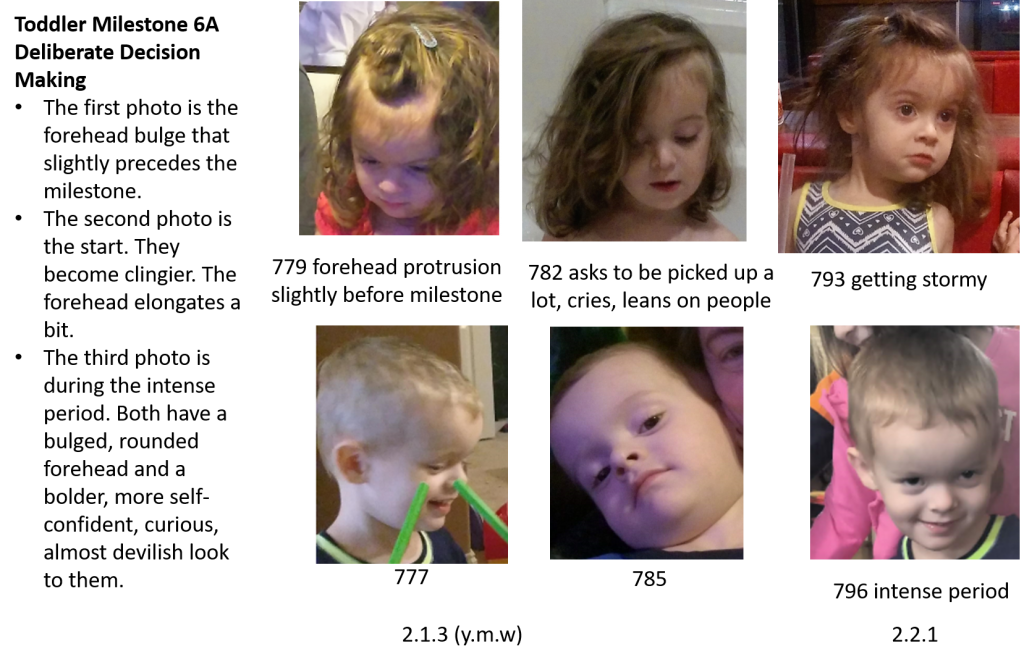
Toddler Mini-Milestone 7A – Fuses the Real and the Fake
Starts: 1 week shy of 2.3.0 [y.m.w]
Most Intense: 2.3.0
Ends: Shortly after
Note: The timing of this one seems to vary for children.
Irritable Period Summary
Clingy or Bossy
• Again clingy
• Might be bossy and insistent on what they want.
• May just really throw their weight around.
New Abilities Summary
A Confusion or Fusing of Real and Fake Things
• Confusion/blending of fake things as real things
• Might think fake food is real food; may take a bite out of Styrofoam food
• Seems to think they can pick up and use a fork as found in a book. It’s as if it “pops out” at them, as if it’s a hologram.
• Or they do something like “scrape” at your face and sprinkle it around, as if that something (your face in this case) is actually something they can spread around, as if it’s dirt (or whatever pretend play they are engaged in)
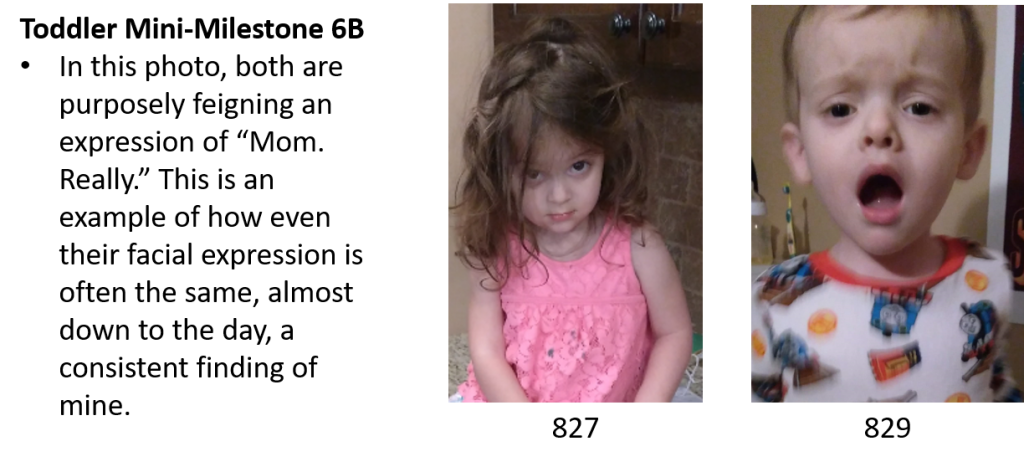
Toddler Milestone 7B – Deliberate Rearranging and Creation
Starts: Between 2.3.2 and 2.3.3 [y.m.w]
Most Intense: Around 2.4.0 and again at 2.5.0
Ends: 2.5.2
Irritable Period Summary
• Begins subtly but with a noticeable change in head shape and size
• You might also see them have “lazy” eyes to the point that they look cross eyed. Look for this around 2.3.2.
• Drooling
• Then hits very suddenly at or before 2 years 4 months
“Rearranges” the Environment, Bossy, Wild
• “Rearranges” many things: throws their cup, puts their shirt on inside out, opens your eye lids, wraps themselves in the curtain, throws their stuffed animals around, etc., in a repeated ongoing way
• Bossy, e.g., about diaper changes or where you are allowed to stand
• They might need to have every single one of their toys before they are willing to have their diaper changed.
• You might have to stand at the top of the stairs, while they walk down first.
• VERY defiant (to get diaper changed, go down for a nap, etc.)
• At times nothing seems to console them
• Extremely clumsy, drops stuff, does very risky things like put their blanket over their head and runs
• Makes many bids for connection throughout the day (put on my socks, take off my socks, watch me play, read a book)
• Playfully lies, such as points to the wrong answer when asked a question
• Major meltdowns. Certain flare-ups can be intense.
• About one meltdown per day in between the two peaks
Strong Fears
• Doesn’t want to leave primary caregiver
• Possessive of primary caregiver
• Their thinking that fake things are real things continues and causes problems.
• They might get upset if you throw away paper in the garbage
• They might think balls on a video game are real and are flying behind the TV
• Or they are very upset by a fake scary shark.
Sleep Issues
• Major sleep disruptions
• A strong chance they only nap 1-2 times per week during the irritable period
• If you push naps when they don’t want to, they might throw themselves aggressively on the floor.
• On some days, may take a 6+ hour nap
Most Intense Period
• This one can be intense—and it’s long.
• There are two peaks at this one. It may be two overlapping milestones. Some see relief in between and others do not.
• A strong fear of abandonment and confusion of fake and real things around 2 years 4 months. They might get really mad you threw something away. They also might think the images in books/shirts are real (e.g., try to pick up and use a picture of a fork).
• Another intense period at 2 years 5 months, in which absolutely nothing seems to console them.
New Abilities Summary
• In the past milestones, they got good at making a data-driven (intelligent) decision. Now their imagination was just turbo charged with the belief that fake things ARE real things.
• This gives them every incentive to twist things around in imagination. They can make deliberate decisions now AND think imaginatively.
Builds from a Script or Idea
• They have a “script” of some sort that they work off of (sometimes literally) and build something intentional.
• They might put on a play, using the pictures in a book as a guide.
• Might follow a visual pattern to build something, e.g., attempts to build a tangram based on the picture of one
• Might put on a play based on a book, for instance a scene from Thomas the Train, over and over
• Can do jigsaw puzzles, specifically they can see a simple picture that should go together and then does it. (That they can know the picture and put it together is between 2 – 12 pieces; they may put larger jigsaw puzzles together by trial and error)
• They might be able to do the puzzles where there are 16 cubes with 6 pictures on each side of the cube.
Deliberate Building
• They build in a way as if they have something in their mind that they want to make a reality.
• Builds elaborately with wooden blocks or other sets on their own in creative ways; uses 10 or 20 or more pieces to do so
• Moves around furniture and items in the house
• Plays with language; mishmashes songs; very fluent
• Plays around and gets refined/nuanced at whatever it is they do, for instance, making nuanced facial expressions to make people laugh (this is highly dependent on each unique child)
You Can See Them Thinking
• You can see them thinking. Perhaps as their eyes dart around thinking of what to do next in a “Follow me” game.
• Seems to constantly be thinking of what they can do with their own body next. Can they hop? Wiggle their leg? Be upside down?
• They might be struck when they see other characters or people thinking about something, such as the “grumpy” character in Green Eggs and Ham when he stops and thinks about eating green eggs and ham.
Visual Acumen
• Can do many Montessori activities, such as the pink tower, with total ease
• They may get the right size block (say of the pink Montessori cubes) on demand to fit into, say, any random box they happen to find.
• They handily match objects to things that are the right shape, such as rods to drawn representations of those rods on paper.
Fuses Fantasy and Reality
• Fantasy and reality are still blurred. When they pretend to be Snow White, they seem to think they ARE Snow White.
• This however allows them to play around wildly, spurring tremendous skills.
• Likes to spin and twist stories. The Prince doesn’t love Cinderella. He loves [your daughter]!!!
• When they wake up, you have to kiss them. Because they’re Snow White.
• They easily use one object to fill in for another, such as a white magnet attached to a magnetic train is a “snow plow.”
• Might enmesh with other family members. They want to wear their hair just “like mom” or have a cup of coffee at the table “like the family.”
Surviving
- Top 5 Tools for Dealing with Children’s Emotions
- Conflict Resolution Tool: Deal with the Emotion First
- When no Tools Work for a Toddler Meltdown
Thriving
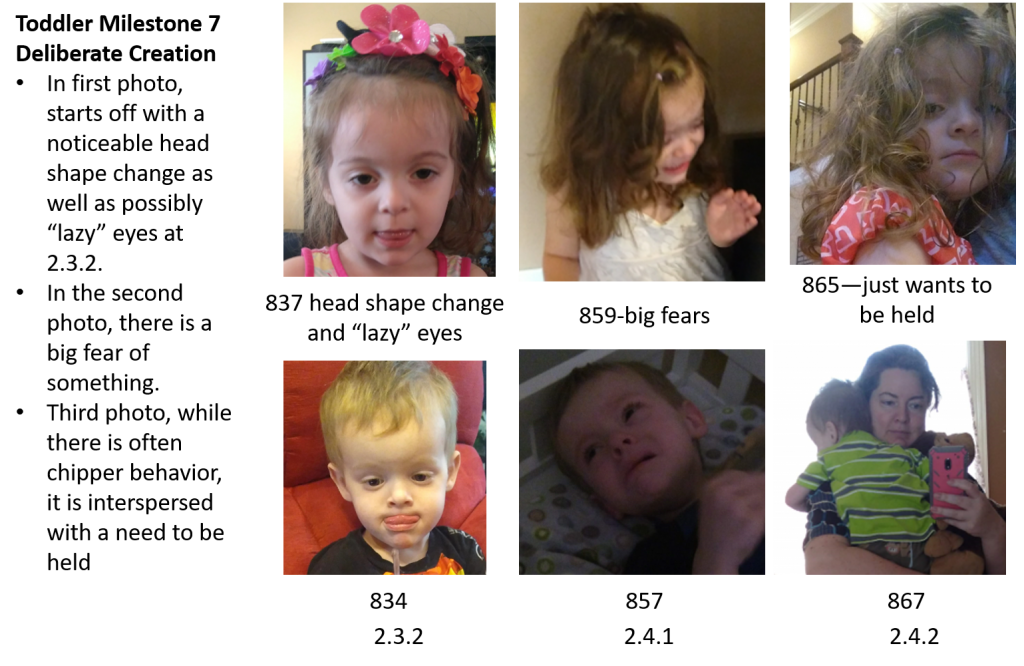
Toddler Milestone 8A – Inference
Starts: 2.5.2 [y.m.w]
Most Intense: Behavior continues to escalate for about 10 days.
Ends: Shy of 2.6.0
Irritable Period Summary
• Note some children do not go through this milestone—at all.
• It is possible that this milestone is shifted for children such that 8A and 8B happen at the same time. Hence please read through the skills listed here even if they don’t seem to go through this one. Otherwise:
Head Shape Change
• Noticeable head shape change slightly before irritable behavior
Clingy
• Starts out subtle at first: wants lovey or to cuddle
• May attack you to get a hug
• May come inside just to give you a huge, then leave
• Or trots off occasionally and becomes inconsolable (a lovey may help)
Defiant, Demanding, Particular
• Defiant ALL day long to get a diaper change, take a nap, etc.
• You might be hearing, “I don’t want to!”
• Wants your attention all day long
• Rigid about the order of things, such as which sock to put on first, then next, then which shoe, etc.
• If they get hurt, you now have to kiss the exact place they got hurt.
• May want a particular caregiver at nursery
• There may be intense nighttime battles.
• If something didn’t go well previously, they make sure it goes better next time. For instance, if they didn’t like only having one book at bedtime the night before, they make sure to line up two books next to your chair, so tonight you read two books.
New Abilities Summary
• They can make an educated guess about what just happened
• They intuitively start to see that things happen in an order over time.
Inference
• They can make an educated guess, with limited evidence, of what just happened.
• If the garage door is open, they can guess that their dad is home.
• If their brother’s door is closed, they guess he is sleeping.
• Note in their early threes, they can predict a next event. At this one, they make a logical conclusion about what did happen (not what’s about to happen).
An Ability to Use the Unseen
• They can think of things not in immediate sight.
• If you ask them what shirt they want, they might say a shirt that is in another room.
• They might like to hide a favorite toy and make you go find it.
• Can come up with a solution of their own, not presented to them. For instance, as they are crying, you ask what can help them, offering maybe a drink or a toy, and they say, unexpectedly, “a kiss”
• They come up with things not in immediate sight or not being currently talked about. Someone tells them they have pretty hair. They say, defiantly, “No! I have brown hair!”
Events Start, End, and Go a Particular Way
• They seem to understand that particular events are of a specific nature and happen at certain times.
• They might say “bye!” every time you leave something or something leaves them. It’s as if to punctuate their understanding that this event is ending.
• Or they might announce “I’m finished!” after finishing something.
• Or they want to carry the doggie bag out of the restaurant. Because they know they are done, and that’s what you do.
• They might be able to handle introductions when being introduced to new people.
• They recognize that things should go a particular way. For instance, they insist on keeping the gate to a fence open, because they want to go get a rock in the yard (inside the gate) then go throw it in a pond (outside the gate).
• Reality and fantasy continue to be fused. They might tell their stuffed animal to “stay,” as if it would otherwise get up and walk.
• They can be, as noted, quite particular about the sequence of events. You have to put both socks on, then their shoes.
1:1 Matching of Problem to Solution:
• There is a deductive matching of cause to effect at this one in which simple connections are made.
• They might give their sibling a hug if they are crying.
• They might do something like press the pause button on the remote and utterly delight that it does actually pause the movie. (This also requires a bigger “leap of faith” that this works, as opposed to, say, hammering a ball in a toy.)
• They might also describe a stuffed animal as “sad,” as what is fake and what is real is still fused. But this shows the increase in empathy, which pulls at the heart strings and encourages problem solving.
• In their imaginative play, they might like to pretend their stuffed animal is “stuck” or “lost” and you need to rescue it.
Toddler Milestone 8B—Sequence of Events
Starts: 2.6.1
Most Intense: 2.6.2 until 2.7.0
Ends: 2.7.2
Irritable Period Summary
• There is noticeable change in head size and shape, several times over the course of this (long) milestone, with more intense behavior following each change in head shape. It’s probably several milestones, but they come one after the other, so I put them in one.
• Note that 8A and 8B might mash together for some children. Please read through the skill set for 8A as well.
Highly Demanding, All Day
• VERY clingy
• Wants your attention all day long, to see what they did or to sit with you. This is, for many, a very frustrating milestone.
• Very jealous; tries to separate you from siblings
• May even throw books at you to get you to read to them
• Bossy, e.g., about where you are allowed to sit
• Refuses naps (won’t go to the bedroom, runs out of the room, etc.), even though very sleepy
• Loves to be messy and muddy
• Still particular about the order of things: you have to go up the stairs first, then Dad, then them
• The irritating behaviors at this one can last all day long. They are very picky about a lot of things—no, THIS for lunch, no make a bottle with tap water not filtered water, no, I want to watch a show, no, Mom, you are not allowed to sit for more than 10 minutes. Sorry in advance.
Plays Around with “Lies”
• Deliberately tells mistruths and often. You give them their favorite stuffed animal, doggie, and ask “Is this doggie?” and they bubble, “That’s not doggie!!”
• Loves to create dramatic little plays where someone or something needs helped or rescued and they do the rescuing
Hates Leaving Fun Things
• Will not want to leave a fun activity, such as being at the playground or taking a bath
• You might anticipate a major meltdown related to this around 2 years 7 months.
Physical Accidents
• Can be very dangerously clumsy, like they get super upset while on a changing table and almost fall over face first
• More likely to get sick
Most Intense Period
• Jealous and bossy about their primary caregiver, may hit or throw to separate primary caregiver from others, may not let primary caregiver move, wants caregiver all day long, gets clumsy and may fall off chairs, changing tables, etc., head first. Be careful when they are simply sitting on a chair even.
New Abilities Summary
• Before, they made an educated guess about what is going on and also started to notice that events go a certain way, at certain times.
• Now they are more intellectual about this process. They can talk about it and make more plans with it.
• They can rely on their past experiences and knowledge to apply a (simple) solution at the right time and place now. In the next milestone, they are more flexible in matching solutions to problems.
Sequence of Events
• Understands sequences of events: “First this, then this” such as “I’ll be with you after I finish my drink.” They intently watch, waiting for you to be done, and then tell you, “You’re done! Now come on!”
• Their new understanding of sequences makes them more cooperative at diaper changes, “First we are going to do this and then we are going to change your diaper.” They submit willingly.
• Might use the word “because,” e.g., “I am not going to cry, because I am happy” This is a sequence of events, as intellectually understood by them. I did this, because of this.
• Can identify themselves as “thinking,” as in “I am thinking about what to do next.”
• Might be capable of doing the beginning steps to sound out letter sounds to read a word, such as “n-e-t” spells “net.”
• They use their knowledge of steps to manipulate the process. For instance, they know they can give their siblings a hug before bedtime. So, they ask to go give the hug. Then they dart off to go play.
• Loves a story in which something goes wrong in the past and it gets rectified. For instance, a child lost a doll and they go back and get it. Peppa Pig and Paw Patrol are ideal for this.
• After the most intense period, their imaginative play becomes more complex: more characters, more plot twists, they execute the actions faster and more reliably.
Continuity of Time
• Understands “yesterday,” “today,” and “tomorrow”
• Remembers past events, say the time they almost lost their shoe while running in the rain, and wants to talk about ot again and again and again and again.
• They know that they are never getting a fun moment back if they leave.
• On the other hand, at times, they seem more comfortable with separation, as if they understand they will reconvene with something or a person in the future.
Imagination Changes
• Before, fake things and reality were fused. They thought a picture of a fork was a real fork.
• Now they note that such things are fake. They are losing this fantastical thinking.
• If they see a cookie drawn on a paper, they may pretend to eat it, but it’s as if they know that’s wrong and they are making a joke.
Applies Simple Solutions at Correct Time and Place
• This is not that they execute what is asked of them through pressure or punishment, e.g., eat your dinner or else you don’t get cake.
• This is that they, on their own, apply a right or wrong solution to a life problem in a conscious, deliberate way. Such as:
• May know that when you get to a road you have to stop and look
• If they get dirty, they may ask to take a bath.
• Says sorry after something went wrong (but only can do it immediately after it happened)
• This might show up very playfully at first. They may get to a road and throw their hands up like “Oh no! A road! Whatever are we going to do!?”
• Or another playful way is they intentionally say the wrong answer to something, emphasizing that they know they can choose to be wrong
• Exaggerates when something goes well maybe saying “Woo hoo!” and when things go poorly such as saying “Oh no!”
• They may purposely pretend to be shocked or scared.
• More reliably understands rules, e.g., they are unlikely to run into the road at any time now, if, say, on the driveway (It’s a relief, really!)
• Follows some directions like “Can you take your pants off?”
• Much more direct in knowing what they want. They might take your hand and lead you directly to the playground down the street.
• This ability to know what they want and how to get it increases greatly after the most intense period at 2 years 7 months, and they become very confident and fast.
Physical Changes
• More deliberate and exact in their fine motor control, e.g., may deliberately place fingers together
• Growth in their legs, arms, and feet
• Whereas before you may have been constantly worried for them when, say, taking a bath, now they are more reliably stable and coordinated.
Surviving
Thriving
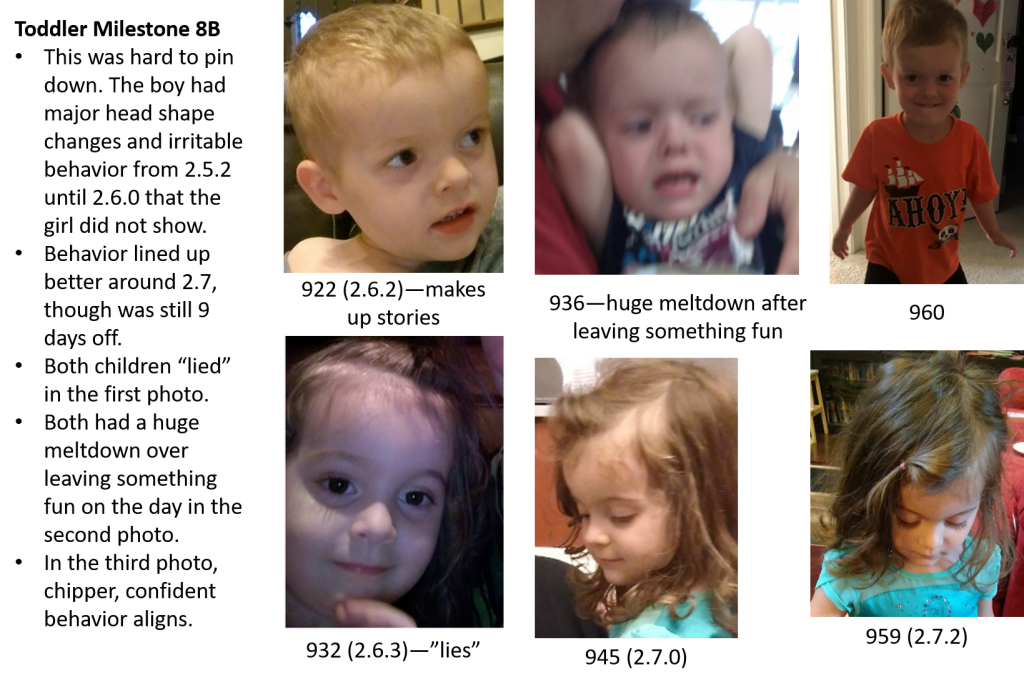
Toddler Milestone 9 – Creative On-the-Spot Problem Solving
Starts: 2.7.3
Most Intense: 2.8.0 until 2.8.1
Ends: 2.8.2
Irritable Period Summary
• Milestones 8 and 9 are so close together as to likely vary and blend for many children as far as when they start.
• Looking at the behavior is, in my experience, the best indicator to know what milestone you are in. Milestone 9 is distinct from Milestone 8. Milestone 8 is marked by defiance all day long. Milestone 9 is marked by confusion and paralysis to solve problems.
Confused and Indecisive
• Becomes confused and indecisive, whereas not long ago they were confident and certain.
• They might ask you to take a walk and then can’t make up their mind about which way to go.
• Seemingly paralyzed to answer a question, e.g., what movie would you like
• Refuses to move to solve a very simple problem. For instance, a toy, cup, or food is a few feet away but they won’t get it and instead cry for it, as if paralyzed to do it.
• Wants to have the toys other children have. I believe this stems from a feeling of indecisiveness over what is the very best toy. Seeing a child with a different toy makes them feel the other toy is better.
• Shows regret over the solution they originally picked. For instance, they agree that one solution is OK, such as dad can turn the light off. But they have a change of mind (and gets upset) a few seconds or minutes later when they seem to realize what is going on, because they wanted to do it.
Jealous, Demanding
• Jealous if their caregiver gives attention to another child or person. They get jealous even if they are in a different room and you are giving attention to another child.
• Tries to separate primary caregiver from anyone or anything else that has the child’s attention or who is not the child. “No! My mommy!”
• Wants you off and on, but now typically wants something specific and then lets you be again
• Very choosy and particular. Out of their entire wardrobe, there might be only two pants that they will consider wearing.
• They might demand you go to a particular store, then and there. Everything about their attitude suggests there is no not going to the store.
• They might march you over to a particular chair and demand you sit.
• Not as likely to want to be right next to you all day long. However, they hate when you leave the room. If they leave the room on their own, it’s fine. If YOU leave, prepare to be attacked.
• You may have trouble doing the simplest of things, like going to the bathroom or going into another room to look something up on a computer.
• Asks to cuddle (some of the behaviors are cute!)
Sleep and Physical Issues
• Refuses naps, screams about being left alone
• Keeps stalling at bedtime to do “just one more” thing or loves to talk late at night
• Directly asks you to come snuggle with them at night, after putting them to bed
• Drools a lot, puts their hand in their mouth
Most Intense Period
• Jealous, demanding, won’t let you freely move, in seeming disbelief of what is going on, paralyzed to act, irritated and sad for seeming no reason, needs extra comfort
New Abilities Summary
Heightened Self and Situational Awareness
• Right away starts with an incredible increase in self-awareness.
• They might all of a sudden be embarrassed to not have clothes on, as if they understand this custom and their deviance from it. (Their last mental awareness dealt with applying correct behavior at a correct time or place.)
• They clearly start to understand when they are near their own house after coming home in a vehicle.
• Has an increase in imagination. Now they are likely to apply their imagination to themselves for a prolonged time. They may pretend they are a crane for days on end and they pick things up like a crane every time they go to do that.
• Their personality reflects this. They act in a pointed way more, putting their whole body into something. They might act shocked or surprised, on purpose, just to do it.
• Or they might build a tower then shoot you a devilish, “Look at what I did!” look.
• Or they throw themselves into play, acting as if they are a sort of “detective” solving a mystery.
• Also starts off with a noticeable increase in attention span, in which they might commit to a craft or other activity for 45 minutes
• Also has better fine motor control, such as they can squeeze a lime
Flexible Solutions to Problems
• Before they could apply one solution to one problem. Now they can choose a solution from many choices.
• You can all but watch them as they see a new problem arise and scan, in their mind, all potential solutions.
• This makes them more adaptable and quicker to apply a solution on the spot.
• If they notice it is cloudy, they might get an umbrella.
• Can match a song to what is going on. They might start singing “Rain, rain, go away,” when they see it’s raining.
• Color objects properly, e.g., colors Ariel’s hair red
• Can match an etiquette to a social situation. When Dad comes home, they might show them Mom, as if introductions are taking place.
• Attempts to solve much more complex problems without help. On the spot, they might figure out how to put batteries in the remote control
• Can correct themselves on the spot better, e.g., they say something wrong and you say it the right way, they say it then the right way
• They might make a joke in which they play off of two things (as they can pick from several solutions now to apply on the spot now). For instance, they tell you to “count backwards.” So you say, “3, 2, 1…” and they say, “No, count BACKWARDS,” and they turn you around so you are facing backwards. It’s cute and funny.
• They might realize now that they can talk to you over the baby monitor. They pick it up and yell through it, “Mommy! I want to snuggle! Goodbye.”
• Advanced-language children might handle more factors needed to read, such that a picture of a cat also relates to the letters “c-a-t.”
• Can apply a solution at a particular time over a more extended time. For instance, you said they could do X in the morning and they wake up, realize it is morning, and they can do X.
• However, you can’t yet tell them to do Y at a time (e.g., “tell daddy Y when he gets home”). This skill develops soon. For now, it’s based on what they personally want to do and a seeming in-the-moment recognition of the time.
Thinks About Problem Solving Itself
• They might initiate a conversation itself about solving problems, such as “What should we do if the baby is crying? I know! How about a bottle!”
• May make up plays about characters who are “great helpers”
• Can go backwards and forwards in solving problems. They might start to build something and realize they made a mistake a few steps back and go back and fix it.
• They talk to themselves as they work through problems, “No, no, that wasn’t right.”
• Starts to make beginning value judgments like “Butterflies are nice” or “This creation I made is great.” Which one is good? Bad? Which way is better?
• Says “I don’t know” now. This suggests they recognize a path forward is possible, but they don’t know which one at the current moment.
Challenges Themselves to Solve Problems Differently
• Likes to challenge themselves with new problems and to use a different solution than normal.
• For instance, they might purposely walk a different way than normal to see if they can find their way home.
• Depending on the child, they might like complicated problems about 3-D space. They might challenge themselves to fit as many blocks as they can in a particular area, say the bed of a toy dump truck.
• Or takes on a complicated challenge such as putting together a Tangram puzzle (will need your help but may be committed to trying to solve it)
• Builds much more elaborate constructions, such as making Thomas the Train, with a funnel, whistle, and cab, out of blocks
• Or makes very long, elaborate train tracks that sprawl the entire toy room and get bigger and different every day
• Has clever solutions to problems, such as building a bridge over something that has a gap or bump (if building with say train tracks or other materials)
• Might play damsel in distress to get others to come help them (it’s one way to solve a problem!)
Surviving
Thriving
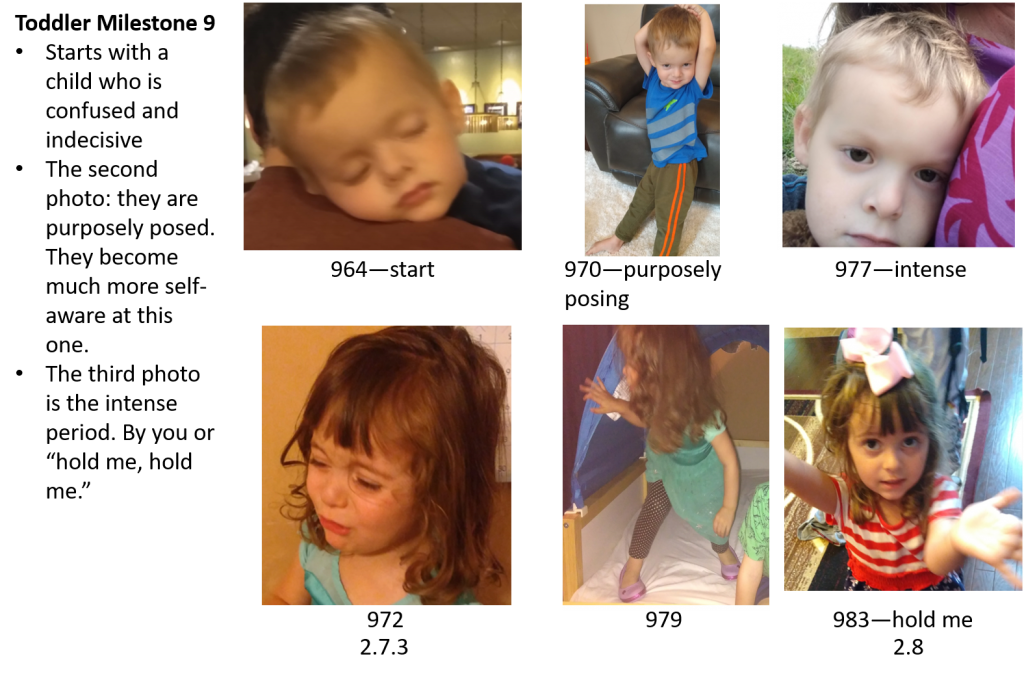
Toddler Milestone 10 – Persistent Imagination and Execution
Starts: 2.8.3 [y.m.w]
Most Intense: A week before 2.9.0 until 2.9.0, getting progressively worse in that time, then starts to dissipate
Ends: 2.9.2
Irritable Period Summary
Clingy
• May be extremely clingy
• Demands primary caregiver be near them often, wants to sit on you often, nestles in really close to you, follows you everywhere, demands your attention by grabbing you often
• They want to be with you, all day, for weeks
• They might choose to be clingy with people other than their primary caregiver now, such as an older sibling.
Bossy, Demanding, Sensitive
• May cry more easily
• Has meltdowns more easily
• Might block people from moving
• Bossy about how routines are executed, e.g., agrees to do something but insists on doing something else first
• Might utterly refuse to agree to something, such as turn off the TV. When you do, they thrash around on the floor.
• They might still insist you sit in a certain place
• They might want their sister’s dinner, not theirs (and are very upset when you don’t let them.)
• Demands a specific type of food or drink that they haven’t had in a year (suggests an upgrade in memory)
Sleep and Physical Issues
• Stalls at bedtime, majorly.
• Wants to stay up insanely late
• May work on their new skills during this time late at night
• Becomes drooly for a day or two
• More prone to illness
Most Intense Period
• Cries, won’t stop an activity without an epic meltdown, may thrash around when you stop them from doing something (say taking their sibling’s dinner), drools, highly possessive of primary caregiver, blocks caregiver from moving, may fall asleep at unusually early hours
New Abilities Summary
• Marked by having much more information in their mind more persistently. They can compare things mentally and execute instructions more reliably with this increase in persistence of imagination.
• This one is marked by a more persistent memory and imagination, resulting in an ability to follow instructions and make mental connections. The next one is marked by the beginning ability to predict a next event.
Mental Connections
• Can notice a pattern between things even if they aren’t immediately in their sight. For instance, while looking at a tomato, they say it looks like an apple.
• Or while looking at the color yellow says it looks like a lemon
• They might put on a silly play with a potato asking if it’s a potato or an avocado.
• Notices similarities, say between a model they built and the real thing
More Persistent Memory
• Can remember new information for a longer amount of time.
• If something interesting happened in the morning, say they saw a big boat, they might tell someone about it in the afternoon.
• If you tell them they can have food after doing X, after they do X, they will demand the food.
• Or they want to take a bath, but you tell them they have to wait until their sibling is done with their bath. When their sibling is done, they tell you it’s time for their bath.
• If inclined to do so, can count to 100.
• Their growth in imagination might help them read as they remember what words are what. They might read one complete sentence out of a familiar book.
Short-Term Instructions
• Follows and commits to verbal instructions better.
• You might tell them, “The safe spot is the sidewalk. Please stand there” and they actually stay there without forgetting they shouldn’t.
• Or you show them how to do an exercise and they copy it well.
• Or you are on a ride and the worker says, “If standing up, hold onto the rail.” They, although previously sitting, stand up and hold the handrail.
• Whereas before they didn’t follow instructions in a class better, now they are the exemplary student.
• On occasion, more accepting about doing something based on the logic of something. For instance, they are agreeable to getting their diaper changed, because you point out that you don’t want them to be dirty.
• Said another way, they follow short-term instructions longer.
Persistent Imagination and Creativity
• Impressive increase in imagination. Perhaps their ability to connect more things mentally spurs originality.
• They might make up plays. Maybe their train gets blocked in by blocks. As far as you know, they’ve never seen this plot line.
• Make up their own, new solutions to problems. Say they want to balance a block and they can’t. They put together many blocks on the bottom to build a platform.
• Or perhaps they go and get a straw for you to drink with. For your glass of wine.
• Starts some simple patterning such as lining up objects by color in the pattern green, yellow, blue. May commit to doing this all day, with patterns getting longer and more complex day after day.
• They also remember things for longer as they re-enact them in their pretend play.
• They might re-enact a lot of stuff that they see. They might put on a play with a basic plot after seeing a show or movie, such as Diesel pushing jobi logs off of a bridge.
• Or if they see, say, a train track structure in a book, they go build an identical one for real.
• Or they see, say, a circle puzzle piece and build a train track creation (or perhaps wood block) creation in a circle
Negotiates
• Negotiates with you on their behalf and in a wild way, e.g., “No the bacon only takes one minute to cook!”
• Clever in figuring out how to get their own way, e.g., if they get to use a phone after a bath, they ask to take a bath often
Cognitive Empathy
• They (might) have empathy on a more intellectual level.
• Might pass bread out at the dinner table to others.
• Might try to make something enjoyable for their stuffed animal, such as setting them up with a book to read.
• Might understand that if they like X, it doesn’t mean others do too
• If they are fighting over a toy and the other gets really upset that they didn’t get it, they might give it to them, “so they are not sad.”
• This really depends on the child, however. Some children can be told they hurt someone and not care at all.
• Sensitive to what you think of them: is the thing they just created good?
Thriving
- Practice Safety by Building a Model Neighborhood
- Buy Misbehavior is Growth: Toddlers
- Buy The Observant Mom App!
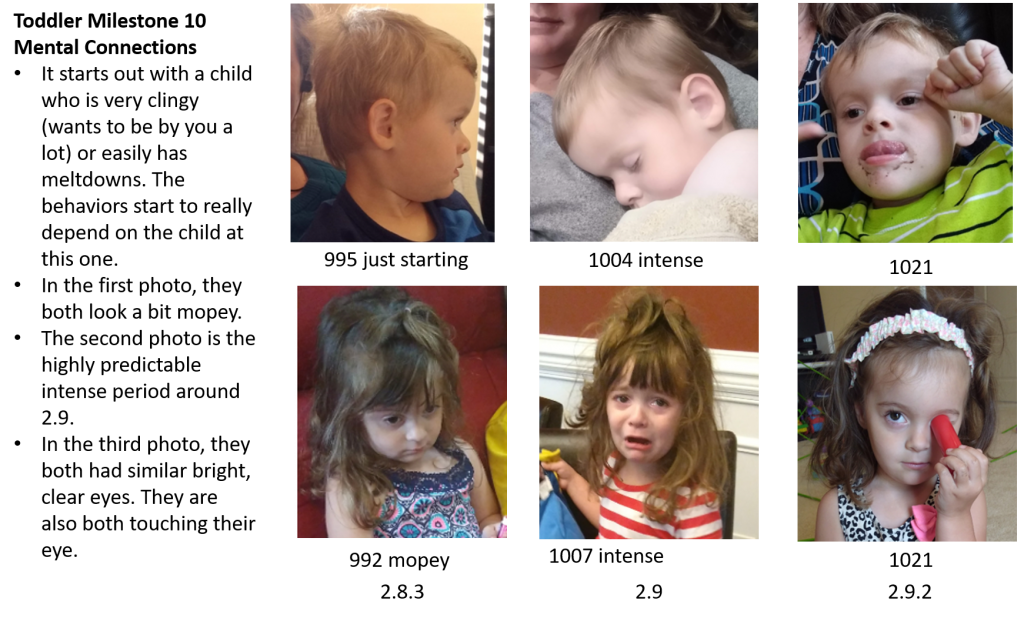
Toddler Milestone 11 – Short-Term Planning
Starts: 2.9.3 [y.m.w]
Most Intense: 2.10.0 until 2.10.1
Ends: 2.10.1
Irritable Period Summary
Jealous, Possessive
• Clingy
• Falls asleep on you
• Possessive of primary caregiver
• Want all toys and food for themselves
• Might demand you all morning and again in the evening
• You might have trouble separating from them to do important business, like answer a phone call.
• May be whiny
Extreme Confusion Over the Timing or Completion of Things
• In seeming disbelief of what is in front of their eyes about what just happened. They might beg you to put butter on their bread—and you do—but they insist it’s not on there.
• They think someone is turning off a movie or turning down the volume to something, when they aren’t.
• A large time delay in responding to real events. For instance, after their head gets stuck in a shirt, they break out into tears about it—several seconds after they are no longer stuck.
• They understand processes continue on or “go out of sight” now.
• They might misconstrue this at first. When you brush their hair, they might think their hair will pull out or fly out.
• Or you have to throw away a bag of food, as it got old, and they get terribly upset
Bossy and Rigid—Down to Seconds and Inches
• Does not handle change well, even immediate change, such as moving a utensil a few inches
• Asks to do something and is upset if it doesn’t happen within microseconds
• Demands you sit in a very exact spot and not even inches different
• Extreme, major meltdowns, probably in public
• Strong desire to do things themselves, resulting in meltdowns if they can’t accomplish something
• Might try to put lipstick on and it ends up all over the bottom of their face
• Might hit you in the head with a toy they are frustrated with
• Bossy to others about their role as they solve a problem they are working on
• May use you as a human “tool,” such as making your hand move their toys for them
• Acts as if they are the driver of the car, “Turn! Turn!”
• Meltdowns can last a looong time now, 30+ minutes
Sleep and Physical Issues
• Want to stay up late
• Falls asleep at weird times
• Might talk in their sleep, such as repeating letter sounds they know
• Uncoordinated and clumsy, may drop glass cups, spill liquids while pouring them, seems to love to grab knives by the blade, and such
Most Intense Period
• One or more terrible meltdowns where they seem confused and in disbelief of what is happening and/or where they boss you around a lot. This one can be through the roof tiresome with some children.
New Abilities Summary
• In the last one, they started to understand that x things happen at y time. This ability strengthens at this one. They are very aware of all plans being made and, now, where they want to be in those plans.
Very Fluid at Understanding Short-Term Future Plans
• Fully understands short-term future plans and makes their desired role in those plans known.
• Understands something like “We can’t have candy now,” because it’s not a convenient time or place. But, on their own, when it is a more appropriate time to have candy (an hour later and after doing a bunch of stuff), they ask about it.
• They might ask about what is happening next.
• Can be told something like “Show Dad this picture when Dad gets home,” and they remember
• Can be involved in planning activities, e.g., bedtime routine
• They very easily handle things up to an hour and pretty well up to a day.
• Similarly understands the short term past. They (might) remember the events of the day and identify them as happening “that day.” But this is typically only if you were just talking about those things with them.
Plans Short-Term Events, Decides How Things Should Go
• Might make a little date with you like “Mommy, come over here and let’s take a nap”
• Very opinionated on how things should go. They are more “rules” oriented. They might admonish others “no taking!”
• May lecture you to “be careful” with them or others
Tries to Act in a Correct Way In-The-Moment
• Much more fluid in their movement. They are unlikely to get as seeming lost in what they are doing as in last milestones. They really change dramatically at this one; they are losing their “babyness” big time.
• Clearly deep in thought while in mid-action, such as when running around and contemplating their next move
• Tries to do what is right while moving, such as being very careful not to spill a drink.
• They can be told, “I don’t like when you hit me here because it hurts,” and they understand and refrain from hitting.
• Understands back and forth banter better
• Might play cheeky little games where they resist but they know if you are clever there is little point in resisting
• Loves to explore places and know their way around
• Understands that red means stop and green means go
• More often reliably cooperative if you explain something like “You’re dirty and need a bath”
• Very forthcoming with saying “Thank you” and “You’re Welcome”
• Takes strong initiative to help other children, such as if another child fell off a bike. They stick with the whole thing, all the way until the child is back up and on the bike again. It’s extremely endearing.
• Or while on a walk, they always want to help. When your stroller gets stuck, “Ok, Mommy, I’ll help you!” As you are trying to get up a hill, “Ok, Mommy, I’ll do it!”
Very Exaggerated in their Likes and Dislikes
• States their strong likes and dislikes
• Might very bossy about what rules are to be followed when around them or how you are to treat them
• States what a favorite thing of theirs is
• Likes to exaggerate when things “GROSSSSS.”
• Loves messy/sensory play
• Love to show you gross things in their mouth
• They get a big kick out of your reaction to smells
Surviving
- The Importance of “Let’s Try Again”
- Toddler Conflict Resolution Tool: Well-Constructed ‘I Statement’
Thriving
- Incredible Reading Comprehension: Putting on a Play with a Toddler
- Buy Misbehavior is Growth: Three Year Olds
- Buy The Observant Mom App!
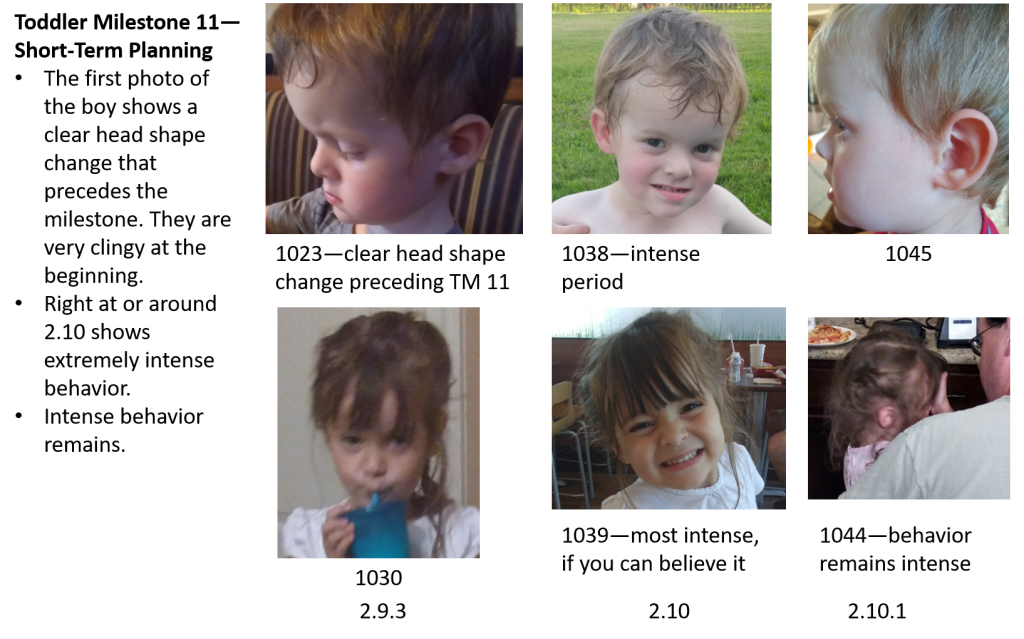
Toddler Milestone 12 – Imaginative Predictions
Starts: 2.10.2
Most Intense: With a bang at 2.11.0
Ends: 2.11.2
Note: Irritating behavior starting at 2.11.3 is Three Year Old Milestone 1A
Irritable Period Summary
• There may be a noticeable head shape change which starts this one.
Clingy
• Starts out sweet and subtle at first
• Wants to sit and cuddle
• Right on you as you exercise or sit
• Attached to your leg
• You might see a few exceptionally sunny days at the beginning, which are the especially sunny times from the last milestone. (They are hard to separate as they overlap.)
Demanding
• Escalates about a week in, to a child who is more demanding
• Whiny
• Meltdowns
• Wants you all day
• Stall at bedtime
• At bedtime, they might say they have to go potty or say they are hungry. But they don’t eat when you get them food.
• Won’t let you leave at bedtime, often up until midnight
No Sense of How Far Away Things Are or How Long Things Take
• They have no sense of how far away things are. They might try to grab the moon.
• This is cute and innocent. It might, however, cause problems when they try to pour a drink and it spills all over.
• Or they put lipstick all over the bottom of their mouth
• If you ask them their sad part of the day, they might answer with something that happened weeks ago.
Disoriented, Confused
• More towards the intense period, they become disoriented and confused.
• They may have just had a toy, but they think you put it away. They keep asking you to get it, even though it is already out, and they should know it’s out.
• They might spill a drink or bite into juicy food, creating a mess, then run around, oblivious to the mess, and take a spill.
• Easily falls off of chairs
In Everything, Bossy
• Wants to be “in” everything, such as medicine and such that they shouldn’t be in
• You might have trouble convincing them they can’t have diaper paste or prescription medicine.
• You might not be able to move without bumping into them.
• The desire to do everything and make messes can be over-the-top frustrating with some children.
• Want to “help” do everything
• Won’t accept “No” as an answer
• Becomes a back-seat driver, dictating what street they want you to go down
Most Intense Period
• This one hits like a truck. The intense part starts off right away potentially with spills, accidents, clumsiness, clinginess, confusion and/or whining. They also might demand to stay up really late. However, it gets greatly dissipates right away.
New Abilities Summary
• They’ve been getting good at seeing how things work and what plans are being made. Now they take their hand at predicting what might happen next. It’s wild and off at first.
Imaginative Predictions
• They are able to predict what next event happens or make a logical guess about what caused something, but in a highly imaginative way.
• This starts right at the beginning of this milestone and follows a clear head shape change.
• They wonder if the person jiggling the door know “is a monster!!!!”
• Their stuffed animals might now be “scared of ghosts.”
• They might make a guess of what will happen next like “Daddy will be back soon.”
• Asks “did you mean?” as they project thoughts about what wasn’t said, but what might have been said
• May understand that food goes into your belly (where you can’t see it)
• May love mystery stories (“who done it?” stories) already
• Might love to initiate and Hide and Seek, as the seeker. They are good at guessing where you are now.
Predictive Solutions
• They like to openly talk about what solutions match what problems. They think of the problem, talk about it, and pick a good tool or action. The problems are not just things happening right now but might happen.
• They might pick up the two utensils at dinner and say, “Fork or spoon? Which one should I choose?”
• They might like to play around with picking the wrong tool for a job, e.g., brushes your hair with a book.
• They might love giving you turn by turn directions to get to the grocery store.
• They might demand you go a different way than usual when driving in your car.
• They come up with solutions outside of the paradigm. If you ask them if they made the right or wrong choice, they might smile, “Um … I made the HAPPY choice!”
• They may love baking cookies or making a smoothie and seeing how all of the individual steps do lead to cookies or a smoothie.
• They are more trusting that, say, at a grocery store, you indeed put your stuff on the conveyor belt and pay for them. As such, they are willing to give up a toy and wait for this process to unfold, as they know the stuff will be handed back to them.
• They might match their understanding of what is going on to what you do. When arriving at a restaurant, they are “so excited to eat!” When they have a blanket on, they are “so excited to be warm!” They might state this in weird ways, but when you probe them, all they are doing is matching the theoretical problem to the solution.
• They might like a book in which you pick the right tool for a job. They might like “Are You My Mother?” Which of these animals is the bird’s mother?
Flexible and Creative in Their Imagination
• They are more flexible and creative in their imaginative play.
• For instance, they put balls on a DUPLO truck and says they are wheels.
• They might make up things in their free play like a toy chest needs a “key” to be opened.
• Their stuffed animals may now also “play with toys.”
• Might love to act out and put on plays, often simple stories like The Gingerbread Man. They may be able to put the entire story on themselves.
More Mental Connections, Often Across Time
• Recalls past events and makes connections
• For instance, a character in a book rescued someone just like their dad rescued them in a pool (which happened in the past)
• They sort their toys at one level of abstraction higher. They might line up all “race cars” (ready to race) and all “spectators” (non-race cars like tow trucks and police cars) on the side (ready to watch). All of these things have x in common and these others have y.
• Might notice that a train rode over a carpet and then left tracks
• Reminds you of something you promised earlier
Emotional Control
• They are much more willing to adhere to requests, even if against their own desire at the time, e.g., please don’t get into that pool you are filling up with water.
• They no longer chase you out of the house if you leave. If they walk you to the door, it’s just because they wanted to say bye.
• Doesn’t just understand but is fully committed to following principles, e.g., “Green means Go” or take their shoes off when you get in the house
• Better emotional control, collect themselves after they fall
• Noticeable better control over their body, don’t fall as much
• Can easily now say “I’m sorry” and “Thank you” even when they are feeling bashful or uneasy.
• Accepting of “No” as an answer
• Better at playing cooperative games where players take turns
Interested in Small Things
• Interested in small details, such as where tiny mice are in their favorite story
• Or that the smallest speck of dirt from a spill needs cleaned up
Manipulates Their Eyes
• They might like to squint their eyes and points to things
• They might close one eye such that the other can focus on something further away.
• Or maybe likes to look at things through a tube
• Or they purposely try to make their eyes be a certain way, such as copying you as you pose for a selfie
Surviving
- The Importance of “Let’s Try Again”
- Toddler Conflict Resolution Tool: Well-Constructed ‘I Statement’
Thriving
- Buy Misbehavior is Growth: Three Year Olds
Synthetic phonics isn’t working - Buy The Observant Mom App!
- Jump to the Three Year Old Milestones
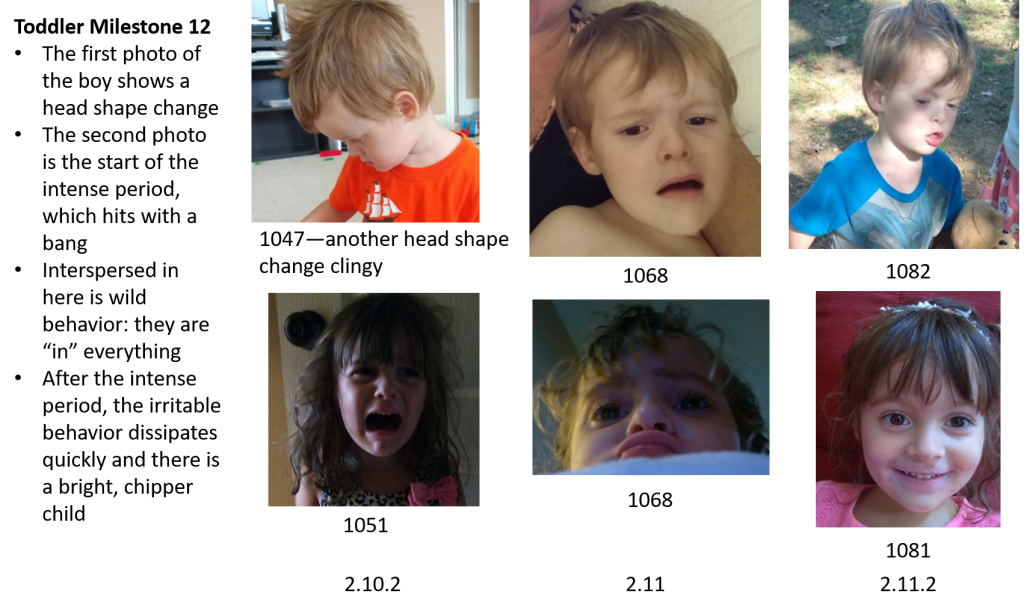
——
Misbehavior is Growth
Misbehavior is Growth: An Observant Parent’s Guide to the Toddler Years
Come follow me at The Observant Mom on Facebook or on YouTube for updates or check back here! Be sure to share this link!
